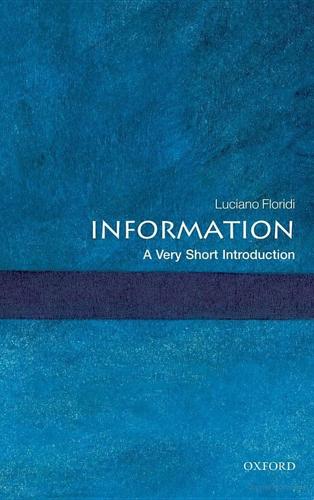
Information: A Very Short Introduction
by
Luciano Floridi
Published 25 Feb 2010
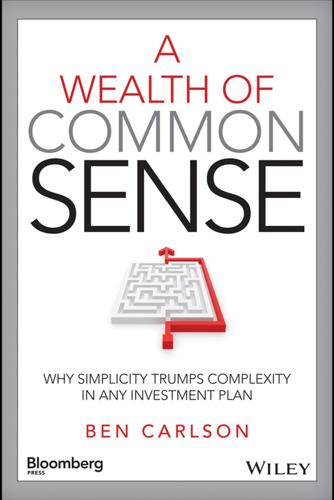
A Wealth of Common Sense: Why Simplicity Trumps Complexity in Any Investment Plan
by
Ben Carlson
Published 14 May 2015
Knittel, & Jeffrey Heisler, “Absence of Value: An Analysis of Investment Allocation Decisions by Institutional Plan Sponsors,” Financial Analysts Journal 65, no. 6 (2009). 9. Andrew Ang, Amit Goyal, & Antii Ilmanen, “Asset Allocation and Bad Habits,” April 2014, www.rijpm.com/pre_reading_files/Goyal_Asset_Allocation_and_Bad_Habits1.pdf. 10. Oliver Stone, Wall Street, Movie, Twentieth Century Fox, 1987. 11. Richard Peterson, Inside the Investor's Brain: The Power of Mind Over Money (Hoboken, NJ: John Wiley & Sons, 2007). 12. Federal Reserve Bank of St. Louis, “The Cost of Chasing Returns,” The St. Louis Fed, September 2014, www.stlouisfed.org/on-the-economy/the-cost-of-chasing-returns/. 13.
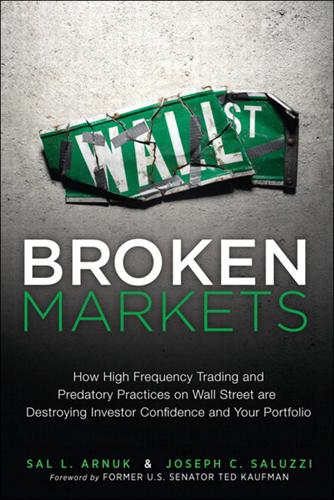
Broken Markets: How High Frequency Trading and Predatory Practices on Wall Street Are Destroying Investor Confidence and Your Portfolio
by
Sal Arnuk
and
Joseph Saluzzi
Published 21 May 2012
Freer “Relativistic Statistical Arbitrage (Physical Review E 82, 056104 (2010)” (Nov. 5, 2010), Alexander Wissner-Gross website, http://www.alexwg.org/publications/PhysRevE_82-056104.pdf. 15. Ivy Schmerken, “Exchanges Say Colocation Is a Regulated Business” (Dec. 20, 2011), Wall Street and Technology website, http://wallstreetandtech.com/exchanges/232300847. 16. Oliver Stone, Wall Street (1987), IMDb website, http://www.imdb.com/title/tt0094291/quotes. 17. Securities and Exchange Commission, “Self-Regulatory Organizations; EDGA Exchange, Inc.; Notice of Filing and Immediate Effectiveness of Proposed Rule Change to Make Available Without Charge the EDGA Book Feed and to Add a Description of the EDGA Book Feed to New Rule 13.8: 2,” rel. 34-64792, file SR-EDGA-2011-19 (no date provided), Securities and Exchange Commission website, http://www.sec.gov/rules/sro/edga/2011/34-64792.pdf. 18.
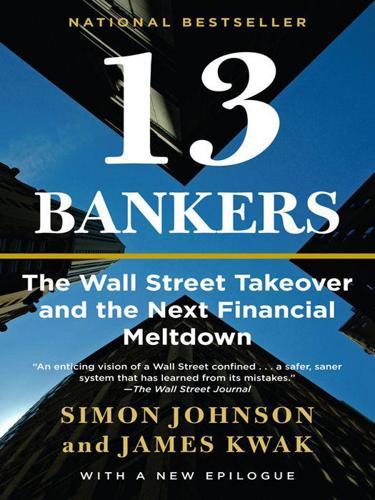
13 Bankers: The Wall Street Takeover and the Next Financial Meltdown
by
Simon Johnson
and
James Kwak
Published 29 Mar 2010
As Bianco put it, “What sets Salomon apart is the sheer scale on which it oper-ates in the markets, reflecting an appetite for risk unrivaled among financial middlemen.” Four years later, Liar’s Poker, Michael Lewis’s memoir of his years at Salomon, would cement its status as the paradigmatic bank of the 1980s, the same decade that produced the original Oliver Stone Wall Street movie, with Gordon Gekko’s famous “Greed is good” speech. Looking back, however, Salomon seems so … small. When the Business Week story was written, it had $68 billion in assets and $2.8 billion in shareholders’ equity. It expected to earn $1.1 billion in operating profits for all of 1985.
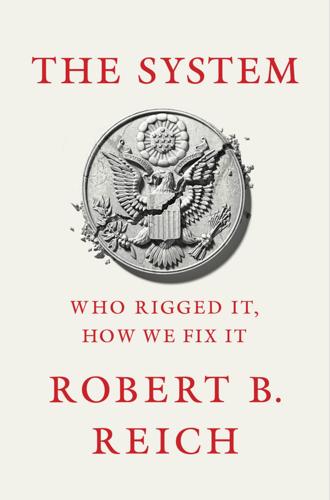
The System: Who Rigged It, How We Fix It
by
Robert B. Reich
Published 24 Mar 2020
Isaac Perlmutter, the CEO of Marvel Comics and a veteran of the Israeli Army, likened dealing with Icahn to negotiating with terrorists. Also like Trump, Icahn came to prominence in the roaring 1980s. As America’s preeminent corporate raider, he was part of the inspiration for the character Gordon Gekko in the 1987 film Wall Street. When Oliver Stone was researching the film, he visited Icahn and borrowed one of Icahn’s observations for the Gekko character: “If you need a friend, get a dog.” (Icahn borrowed the phrase from Harry Truman’s description of life in Washington. It’s unclear whether Icahn also supplied the most memorable line in the film: “Greed, for lack of a better word, is good.
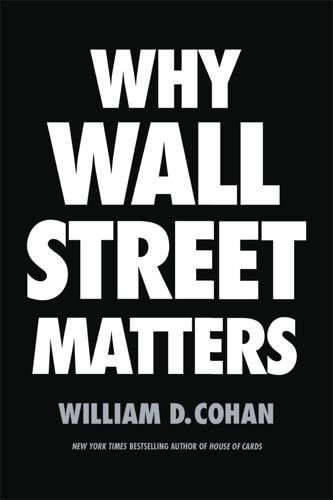
Why Wall Street Matters
by
William D. Cohan
Published 27 Feb 2017
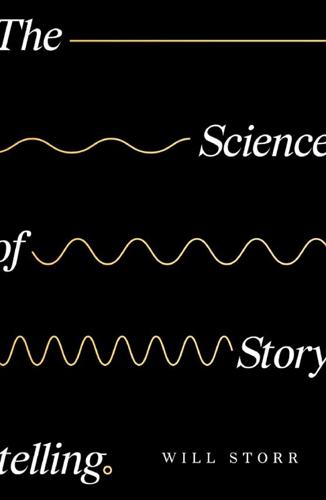
The Science of Storytelling: Why Stories Make Us Human, and How to Tell Them Better
by
Will Storr
Published 3 Apr 2019
THE ARGUMENT Increasingly, writers come to the course who are angry about something that’s happening in the world. They want to write a story that highlights some perceived societal problem. Say you’re angry about the US healthcare system, so you decide to write a kind of healthcare version of Oliver Stone’s Wall Street. It centres on a Gordon Gekko type who ramps up the price of an essential medication. Fine. The risk is that, if you don’t do the necessary character work, ‘a healthcare version of Oliver Stone’s Wall Street’ is exactly what you’re going to end up with. No matter where your inspiration came from or what kind of story you want to write, I believe no harm can ever come from rewinding to character.
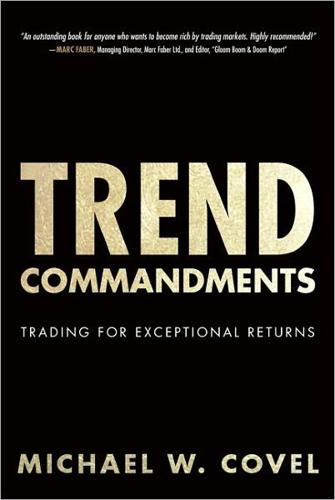
Trend Commandments: Trading for Exceptional Returns
by
Michael W. Covel
Published 14 Jun 2011
Tre n d C o m m a n d m e n t s James Montier, “Mind Matters: Forever Blowing Bubbles: Moral Hazard and Melt-up.” Societe Generale, June 2, 2009. 10. “The Monsters Are Due on Maple Street.” The Twilight Zone, March 4, 1960. 11. Barry Ritholtz, “Why politics and investing don’t mix.” Washington Post, February 6, 2011. Speculari 1. Wall Street: Money Never Sleeps, dir. Oliver Stone, perf. Michael Douglas, DVD, 20th Century Fox, 2010. 2. Wall Street, dir. Oliver Stone, perf. Michael Douglas, DVD, 20th Century Fox, 1987. 3. The Winton Papers. See http://www.wintoncapital.com. 4. Todd Miller, Blog post responding to the Winton Papers, November 6, 2010. See http://www.michaelcovel.com/2010/11/06/the-winton-papers-speculation-wise/. 5.
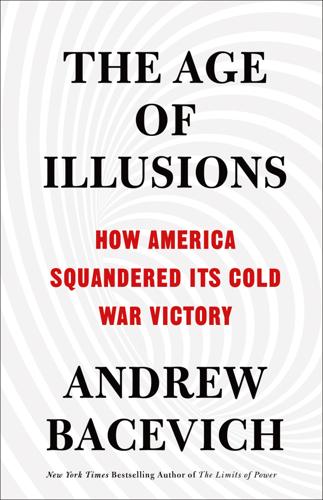
The Age of Illusions: How America Squandered Its Cold War Victory
by
Andrew J. Bacevich
Published 7 Jan 2020
And during the 1980s, as if by acclamation, greed got the nod. Inverting the title of William Wyler’s Oscar-winning film of 1946, the journalist Barbara Ehrenreich surveyed the period and called it The Worst Years of Our Lives.5 If Wyler’s Best Years had seemed to capture the essence of the immediate postwar period, its 1980s counterpart was Oliver Stone’s Wall Street, released in 1987. Stone’s film centered on a cutthroat business executive, Gordon Gekko, who operated on the principle that “greed is good.” In comparison with Trump’s real-life brashness and extravagance, the celluloid Gekko looked like a piker. Like Gekko, however, Trump embodied values that seemed, at least for a moment, to express something essential about the United States.
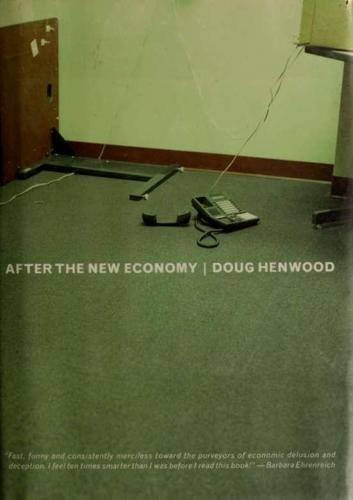
After the New Economy: The Binge . . . And the Hangover That Won't Go Away
by
Doug Henwood
Published 9 May 2005
Using the word makes it harder to talk sharply about things Uke the intensified rule of money, the dismantling of social protections, and the exercise of imperial power. "GlobaHzation" has had a busy decade; it needs a long rest. 5 Finance / believe in the market/I believe in me. —Brown & Co. ad on CNBC It took about fifteen years for the bull market to make it big in pop culture. Yes, the 1980s had Oliver Stone's Wall Street, but we were well into the 1990s before you could walk into a bar and watch CNBC where you once would have seen ESPN. There'd never been anything Hke it. Despite tales of speculating shoeshine men in the 1920s, only about a million Americans played the market. Depending on definitions, figures for the late 1990s were as much as one hundred times as high, Now it's mostly recalled with nostalgia or a "What were we thinking?"
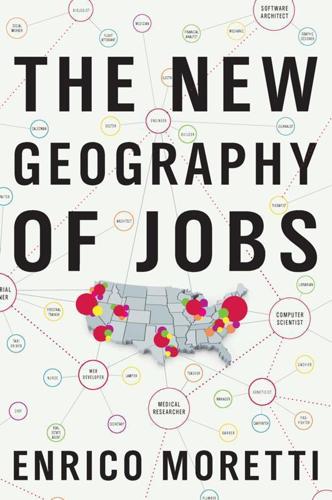
The New Geography of Jobs
by
Enrico Moretti
Published 21 May 2012
Between 1946 and 1978, this guy’s hourly wage measured in today’s dollars went up from $8 to $16. Since 1978 his wage has actually gone down by $2. What happened? What caused such a stunning reversal? Many people place the blame on banks and financiers. This notion is ingrained in the national psyche and considerably older than the Occupy Wall Street movement. In Oliver Stone’s acclaimed movie Wall Street, the economic transformation of the 1980s is portrayed as a fight between the honesty and purity of Main Street, embodied by a solid, contented blue-collar union representative played by Martin Sheen, and the corruption and moral recklessness of Wall Street, embodied by Martin Sheen’s son Charlie.
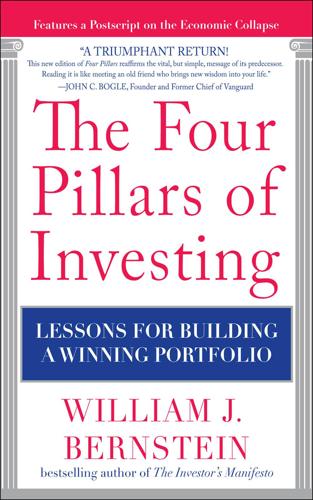
The Four Pillars of Investing: Lessons for Building a Winning Portfolio
by
William J. Bernstein
Published 26 Apr 2002
Tops: A History of Manias Chapter 6. Bottoms: The Agony and the Opportunity Pillar Three: The Psychology of Investing Chapter 7. Misbehavior Chapter 8. Behavioral Therapy Pillar Four: The Business of Investing Chapter 9. Your Broker Is Not Your Buddy Chapter 10. Neither Is Your Mutual Fund Chapter 11. Oliver Stone Meets Wall Street Investment Strategy: Assembling the Four Pillars Chapter 12. Will You Have Enough? Chapter 13. Defining Your Mix Chapter 14. Getting Started, Keeping It Going Chapter 15. A Final Word Bibliography Index 2010 Postscript Preface In the mid-1990s, I began writing a small book, The Intelligent Asset Allocator, which ultimately became a “successful failure”: successful because it attracted positive notice and sold enough copies to please my publisher and myself, and a failure because it did not accomplish its ultimate goal.
…
Not only does past performance not predict future manager performance, but excellent performance leads to the rapid accumulation of assets, which increases impact costs and reduces future return. 3. Be cognizant of the corporate structure and culture of your fund company. To whom do its profits flow? Is it an investment firm or a marketing firm? 11 Oliver Stone Meets Wall Street No matter how cynical you become, it’s never enough to keep up. Lily Tomlin The third, and least obvious, leg of the financial industry stool is the press, for it is reporters, editors, and publishers who inform and drive the investment patterns of the public. The relationship between the fourth estate and the brokerage and mutual fund industries is subtle, complex, and immensely powerful.
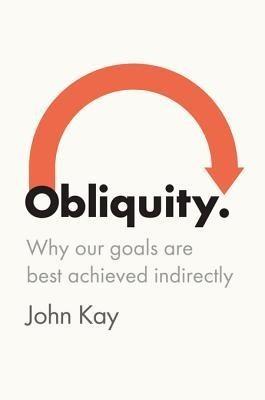
Obliquity: Why Our Goals Are Best Achieved Indirectly
by
John Kay
Published 30 Apr 2010

The Raging 2020s: Companies, Countries, People - and the Fight for Our Future
by
Alec Ross
Published 13 Sep 2021
These critics argued that government had kept a lid on business for too long: managers of big businesses had grown complacent and had stopped driving profits, and the whole economy was stagnating as a result. If companies were turbocharged to maximize profits, it would jolt the whole country and the whole world into growth. To get there, all you had to do was prioritize profit. A pithier version of Friedman’s big idea soon swept through the culture, expressed by Gordon Gekko in Oliver Stone’s Wall Street: “Greed is good.” The effect of shareholder primacy was to drive a stark line between a company’s shareholders and its stakeholders, defined as every other party affected by its business and including its employees, its community, its country, its customers, and the environment. Under the new model, shareholder profits came first and foremost, and any significant investment in other stakeholders became a liability.
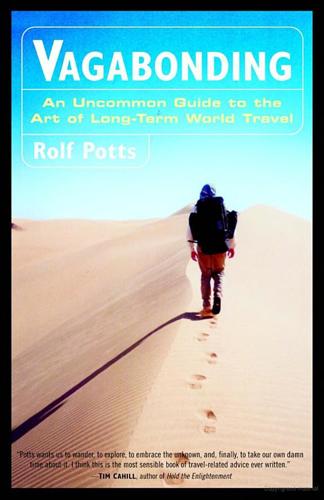
Vagabonding: An Uncommon Guide to the Art of Long-Term World Travel
by
Rolf Potts
Published 24 Dec 2002
— WALT WHITMAN, “SONG OF THE OPEN ROAD” Declare Your Independence Of all the outrageous throwaway lines one hears in movies, there is one that stands out for me. It doesn’t come from a madcap comedy, an esoteric science-fiction flick, or a special-effects-laden action thriller. It comes from Oliver Stone’s Wall Street, when the Charlie Sheen character — a promising big shot in the stock market — is telling his girlfriend about his dreams. “I think if I can make a bundle of cash before I’m thirty and get out of this racket,” he says, “I’ll be able to ride my motorcycle across China.” When I first saw this scene on video a few years ago, I nearly fell out of my seat in astonishment.
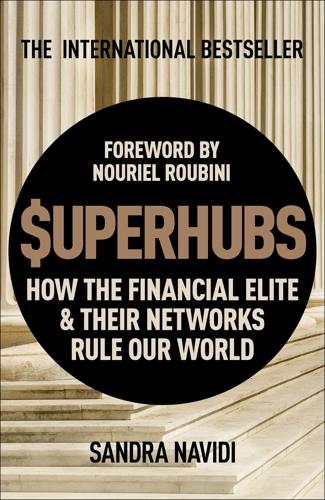
SUPERHUBS: How the Financial Elite and Their Networks Rule Our World
by
Sandra Navidi
Published 24 Jan 2017
His folksy, backslapping, high-fiving demeanor is not everyone’s cup of tea, but those who dismiss him grossly underestimate his intelligence and strategic prowess. Scaramucci is a talented schmoozer with a knack for self-promotion, yet his consistent energy makes it all seem authentic. He cleverly product-placed a large SkyBridge banner in Oliver Stone’s Wall Street II, and even landed a cameo. He further enhanced his profile with his well-received book, Goodbye Gordon Gekko, which was a timely self-critical reflection on Wall Street’s culture of greed. His rise has been extraordinary, and Davos has played no small part in it. While many of Scaramucci’s most valuable contacts stem from the WEF, he has since spread his wings far beyond the WEF and built his own wildly successful forum, the SkyBridge Alternatives Conference (SALT).
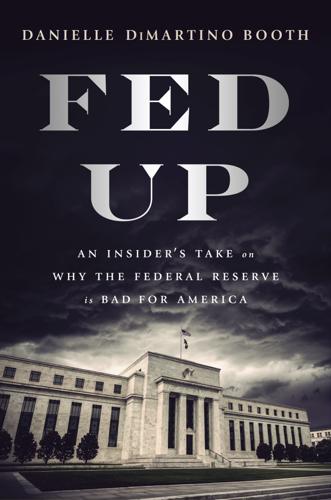
Fed Up: An Insider's Take on Why the Federal Reserve Is Bad for America
by
Danielle Dimartino Booth
Published 14 Feb 2017
Despite evidence that the housing market: FR: FOMC Statement, March 28, 2006, www.federalreserve.gov/newsevents/press/monetary/20060328a.htm. “It just doesn’t make sense”: Danielle DiMartino, “Fed Hike Seen As Certainty,” Dallas Morning News, October 31, 2005. CHAPTER 4: INSIDE THE BLACK BOX Lunch is for wimps: Wall Street, directed by Oliver Stone (1987; Los Angeles: Twentieth Century Fox). “The ramifications extend far beyond”: Danielle DiMartino, “For Many, Homes Becoming a Liability,” Dallas Morning News, September 14, 2006. The entire first floor of the bank: FRBD: “About the Dallas Fed,” www.dallasfed.org/fed/dallas.cfm.
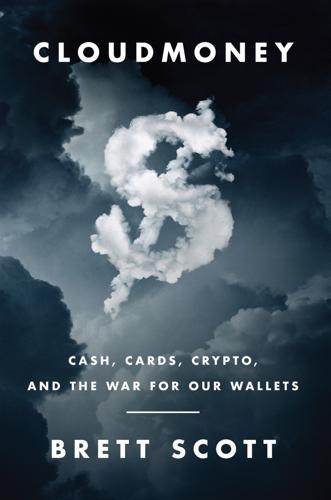
Cloudmoney: Cash, Cards, Crypto, and the War for Our Wallets
by
Brett Scott
Published 4 Jul 2022
Morgan, 8, 96, 150, 156, 227, 232 Jamaica, 42 Japan, 18, 35, 135, 215, 248 Johannesburg, South Africa, 129 Johnson, Alexander Boris, 38 Kazakhstan, 11, 227–9, 233, 247 Keep Cash UK, 262 Kelly, Kevin, 12 Kentridge, William, 144 Kenya, 47, 75, 129, 130–31, 169, 178, 179 Kerouac, Jack, 173, 175 Keynesianism, 80 ‘Kindness is Cashless’, 40 Kiva, 238 Kowloon Walled City, Hong Kong, 216, 219, 220, 226 Kuala Lumpur, Malaysia, 60, 74 Kurzweil, Ray, 153, 252–3 Kyoto, Japan, 135 La Guardia Airport, New York, 128 learning methodology, 163–4 left-wing politics, 7, 184, 191, 211–12, 215 Lehman Brothers, 17–18 Lenddo, 169 Level 39, Canary Wharf, 17, 20, 27, 41, 143 Leviathan (Hobbes), 177 leviathans, 177–84, 215–16 libertarianism, 7, 14, 42, 155, 156, 184 cryptocurrency and, 191, 212, 215–16, 225–6 Libra, 236–41, 245 Litecoin, 218 Lloyds, 72–3, 144, 146 loans, 70–71, 107, 159 artificial intelligence and, 167–8, 172 London, England, 128, 247, 248 Brixton Market, 177 Camberwell, 128 Canary Wharf, 17–18, 20, 41, 62, 211 City of London, 6, 135 Mayor’s Fund, 38 Somali diaspora, 116, 179 Stock Exchange, 24 Underground, 11, 37–8, 86, 87 longevity derivatives, 160 Lonsdale, Joe, 155 Lord of the Rings, The (Tolkien), 19, 155 Los Angeles, California, 101 Luther, Martin, 212 M-Pesa, 79, 109 machine-learning systems, 163–4 Macon, USS, 153 Mafia, 163 Main Incubator, 143 Malaysia, 7, 45, 60, 74 Malick, Badal, 127–8 malware, 32 manifest destiny, 212 ‘Manifesto for Cashlessness’ (Emili), 37 Maputo, Mozambique, 96 Marcus, David, 237, 241 Maréchal, Nathalie, 113 marijuana industry, 101–3 market price, 29, 171 markets, 65, 124–6, 176–80 choice and, 124–6 giant parable, 54 informal, 176–9 oligopolies and, 124–5 payments companies and, 29, 30, 31, 32–3 Marxism, 155, 262 Massachusetts, United States, 46 Massachusetts Institute of Technology (MIT), 7 Mastercard, 30, 37, 39, 77, 91 automatic payments, 149 data, 109, 111 financial inclusion and, 131–2 Wikileaks blockade, 116 Masters, Blythe, 232 Matrix, The (1999 film), 226 Mayfair, London, 6 McDonald’s, 145, 153 Medici family, 135 Melanesia, 255–6 Mercy Corps, 131, 132 Mexico, 42 Microsoft, 7 Azure cloud, 233 Word, 32, 156 middle class, 86, 128, 129 Mighty Ducks, The (1992 film), 234 Military Spouse, 153 millennials, 86, 140 Minority Report (2002 film), 10 mis-categorisations, 167 mist, 30–33 MIT Media Lab, 7 Modi, Narendra, 43, 93 Moffett airfield, California, 153 Monetarism, 80 money creation, 59–63, 67–72, 202 Money Heist (2017 series), 61 money laundering, 42, 116 money users vs. issuers, 50–52 money-passers, 30, 32–3 Monzo, 113, 142 Moon Express Inc., 153 mortgages, 26–7, 94 motor cortex, 248 Mountain View, Silicon Valley, 153 Moynihan, Brian, 38 Mr Robot, 184 Mubarak, Hosni, 116 Mugabe, Robert, 239–41 Mumbai, India, 96 Musk, Elon, 15, 212, 257 mutual credit systems, 259–60 N26, 142 Nairobi, Kenya, 129, 179 Nakamoto, Satoshi, 13, 184–5, 187, 191, 204 NASDAQ, 157, 233 National Aeronautics and Space Administration (NASA), 153 National Arts Festival, 144 National Retail Federation, 86 National Security Agency (NSA), 112, 155 Nationwide, 145–6 Natural Language Processing (NLP), 146 natural market order, 192 Nazarbayev, Nursultan, 227 Neener Analytics, 169 neo-Nazism, 226 nervous system, 20–22, 57, 80, 81, 240, 247–8, 251–2 Nestlé, 24, 28 Netflix, 61 Netherlands, 48, 49, 128–9 Nets Union Clearing Corp, 115 Network Computing, 78 New Age spiritualism, 7, 14, 193, 226 New Jersey, United States, 46 New Scientist, 137 New World Order, 261 New York City, New York, 18, 91–2, 128, 248 La Guardia Airport, 128 Wall Street, 6, 178–9 Nigeria, 43 No Cash Day, 37 no-file clients, 169 Nobel Prize, 93 nomadism, 228 non-seepage, 73 Norway, 35 nudging, 39, 93, 114 Nur-Sultan, Kazakhstan, 11, 227–9 O’Gieblyn, Meghan, 154 Oakdale, California, 101 Occupy movement (2011–12), 211, 215 Office of National Statistics, 83 oil industry, 6, 22–4 oligopolies, 2, 12, 15, 89, 124–5, 142, 151, 180–83, 191 cryptocurrencies and, 229–33, 246 On the Road (Kerouac), 173, 175 OpenBazaar, 229 OpenOil, 24 operating system, 141–2 Oracle, 109 Oxford English Dictionary, 144 Pakistan, 61 Palantir, 155, 157, 226 Panama Papers leak (2016), 81 panopticon effect, 118–19, 172 Papua New Guinea, 191 passive process, 125–6 PATRIOT Act (2001), 111, 179 payments companies, 30, 32–3, 39–41, 77–8, 79 automatic payments, 149 data, 108–9 interpellation, 86–7 plug-ins, 79, 115, 141–2 PayPal, 50, 79, 109, 155, 226, 233–7, 243 New Money campaign (2016), 86–7 Wikileaks blockade, 116 Payter, 31–2 Paytm, 44, 79, 150 Peercoin, 218 Penny for London, 37–8 pension funds, 7, 23 People’s Bank of China, 79, 242 periphery, 28, 248 Peru, 129–30, 176 Peter Diamandis, 153 Philadelphia, Pennsylvania, 41, 133 Pierce, Brock, 234 Piercy, Marge, 150 Pisac, Peru, 129 point-of-sales devices, 40, 77, 130 points of presence, 148 poker games, 91 Poland, 37, 91 police, trust in, 93 Politics of Bitcoin, The (Golumbia), 225 posture, 49 pre-capitalist societies, 55, 215, 251 Premier League, 231 primary system, 50–64 Privacy International, 168 privacy, 2, 43, 44, 46, 47, 104–19 private blockchains, 229, 231 Prohibition (1920–33), 102 promises, 50, 52, 58–9, 61, 70–72, 205–6, 259–60 casino chips, 68–9 deposits as, 69 digital money, 70–72 giant parable, 52–6, 63–4, 188 loans, 70–71, 107, 159 mutual credit systems, 259–60 Promontory Financial Group, 38 Protestantism, 212, 255 psilocybin, 226 psychometric testing, 169 pub quizzes, 91 Pucallpa, Peru, 130, 176, 249 Puerto Rico, 234 Quakers, 135 Quechuan people, 129 Quorum, 232 R3, 233 RAND Corporation, 105 re-localisation, 259 re-skinning, 16, 135–51, 171, 175 Red Crescent, 131 refugees, 131–2 Reinventing Money conference (2016), 31 remittances, 105, 116 Revolut, 140, 142 right-wing politics, 7, 14, 184, 191–3, 211–12, 215, 225–6, 261 rippling credit, 260 risk-adjusted profit, 94 Robert Koch Institute, 34 robotics, 11 Rogoff, Kenneth, 47, 92–3 rolling blackouts, 247 Roman Empire (27 BCE–395 CE), 55–6 Romeo and Juliet (Shakespeare), 29, 30, 32 Rowe, Paulette, 38 Royal Bank of Canada, 158 Royal Bank of Scotland, 62 Russia, 6, 42, 48, 140, 227 Samsung, 11 San Francisco, California, 35, 46, 119, 133, 179, 247 Sān people, 4 Santander, 38 Sardex system, 259 Satoshi’s Vision Conference, 215 Save the Children, 131 savers, 25 Scott, James, 228 seasteading, 156, 216 secondary system, 50, 63–4 self-service, 145–6 SEPA, 80 September 11 attacks (2001), 111 Serbia, 7 sex workers, 96 Shakespeare, William, 29 Shanghai, China, 18, 115, 248 Shazam, 180 Sherlock Holmes series (Doyle), 114, 162, 165, 166 Shiba Inu, 13 Shipibo-Conibo people, 130 Sikoba, 260 Silicon Valley, 7, 9, 139–41, 148, 153, 180, 221 Libra, 237 Singularity, 154–6, 252–3 Silk Road, 227, 229 Singapore, 11, 18, 168, 248 Singularity, 153–6, 226, 252, 252–3 Singularity University, 153–6, 252–3 six degrees of separation theory, 260 skyscrapers, 17–20, 27, 253 slow-boiling frogs, 104 smart cities, 11, 180 smart contracts, 220–24, 258 smart homes, 180 smartphones, 4, 28 financial inclusion and, 95 posture and, 49 Smith, Adam, 251 smoking, 181 Snow Crash (Stephenson), 10 social class, 91–9, 113, 128, 129, 155, 167 Somalia, 116, 179 South Africa, 3–4, 11, 28, 55, 62, 128, 175–6 apartheid, 95 hut tax, 55 National Arts Festival, 144 rolling blackouts, 247 syncretism in, 175–6 South Sudan, 105 Spiegel, Der, 112 Spotify, 166 spread-betting companies, 26 stablecoins, 233–41, 245–6, 255 Standard Bank, 95, 144 states, 42–5, 50–64, 176–85, 215 anti-statism, 42, 184, 215–16 base money, 69 centralisation of power, 15, 180–83 cryptocurrency and, 215 data surveillance, 110–12, 114–15, 155, 168 digital currencies, 242–5 expansion and contraction, 57–8 giant parable, 52–6, 63–4 markets and, 176–80 money issuance, 58–9 primary system, 50, 51, 63 Stockholm syndrome, 121, 131 sub-currencies, 72–3 sub-prime mortgages, 26–7, 94 subsidiary companies, 24, 26–7 Sufism, 91 suits, 124 Sunset Boulevard, Los Angeles, 101 Super Bowl, 8, 261 super-system, 3 supply, 29 surveillance, 2, 7, 8, 10, 15, 33, 39, 42, 72, 104–19, 153–72, 180, 250 artificial intelligence and, 153–72 banking sector and, 108–9 Big Brother, 113–15 CBDCs and, 244, 245 panopticon effect, 118–19, 172 payments censorship, 116–18 predictive systems, 105 states and, 110–12, 114–15, 168 Suspicious Activity Reports (SARs), 111 Sweden, 35, 43, 48, 84, 121 Sweetgreen, 91, 93 SWIFT, 32, 75–6, 80, 108, 112 Switzerland, 35, 108 Symbiosis Gathering, 101 syncing, 195–7, 200–202, 231 syncretism, 175–6 systems failures, 32, 34, 48 Szabo, Nick, 220 Taiwan, 234, 235 Tala, 169 taxation, 55, 57, 110 evasion, 42, 43, 45, 46 TechCrunch Disrupt, 130 Tencent, 2, 7, 114, 178 terrorism, 42, 48, 112, 127 Tether, 234–5, 241 Thaler, Richard, 93 Thatcher, Margaret, 193 Thiel, Peter, 155, 226 thin-file clients, 169 timelines, 197–200 Times of India, 44 tobacco, 181 Tokyo, Japan, 18, 215, 248 Tracfin, 112 transfers, 74–8 transhumanism, 180 Transport for London, 11, 37–8, 86, 87 Transylvania, 65 Trustlines, 260 Twitter, 167, 198 Uber, 2, 149, 177, 179, 237 Uganda, 168 unbanked, 35, 94, 181, 238 underdog, support for, 106 Unilever, 99, 131 United Kingdom American Revolutionary War (1775–83), 60 banking oligopoly, 230 Canary Wharf, 17–18, 20, 41, 62, 211 cash use in, 249 City of London, 6, 135 colonialism, 55, 97, 175–6, 178, 239 digital money system in, 72 GCHQ, 112 HMRC, 110 Premier League, 231 Royal Mint, 60 Somali diaspora, 116, 179 Taylor Review (2016–17), 110 Transport for London, 11, 37–8, 86, 87 United Nations, 14 blockchain research, 222 Capital Development Fund, 37 World Food Programme, 132 United States cash use in, 41, 46, 133 CBDCs and, 244–5, 254 Central Intelligence Agency (CIA), 155 China, relations with, 74–5, 245, 255 data surveillance, 111–12, 155 dollar system, 80, 182, 210, 233–6, 239, 240 Federal Bureau of Investigation (FBI), 111, 155 Federal Reserve, 32, 35, 36, 234 Financial Crimes Enforcement Network, 111 hurricanes in, 36 leviathan complex, 178 marijuana industry, 101–3 NASA, 153 National Security Agency (NSA), 112, 155 Occupy movement (2011–12), 211, 215 PATRIOT Act (2001), 111, 179 Prohibition (1920–33), 102 Revolutionary War (1775–83), 60 Senate, 105–6 September 11 attacks (2001), 111 Singularity University, 153–6 Super Bowl, 8, 261 Wall Street, 6, 178–9 Uruguay, 42 USAID, 45, 127, 178, 179, 245 vending machines, 31–2, 220 Venmo, 79, 243 Ver, Roger, 212, 214, 215 Vienna, Austria, 7 virtual reality, 10 Visa, 15, 30, 31, 37, 39, 40, 41, 44, 77, 80, 127, 174, 255 automatic payments, 149 data, 108, 109, 111, 112 plug-ins, 142 USAID and, 128, 178, 245 Wikileaks blockade, 116 VisaNet, 77 Wall Street, New York City, 6, 178–9 Occupy movement (2011–12), 211, 215 Wall Street (1987 film), 8 Wall Street Journal, 133 Warner, Malcolm, 106 WarOnCash, 37 Weber, Max, 179 WeChat, 79, 109, 114–15, 150 welfare, 43, 113, 118 Wells Fargo, 109, 234, 235 WhatsApp, 75, 198, 237–8, 244, 255 Wikileaks, 116, 183 Wilson, Cody, 216 Winton Motor Carriage Company, 87, 90 Wired, 12 World Economic Forum, 11 World Food Programme, 132 World Health Organisation (WHO), 34 World of Warcraft (2004 game), 234 Xhosa people, 175–6 YouTube, 163, 166, 167, 170 Zambia, 131 Zimbabwe, 11, 239–41, 245 Zuckerberg, Mark, 241 About the Author BRETT SCOTT is an economic anthropologist, financial activist, and former broker.
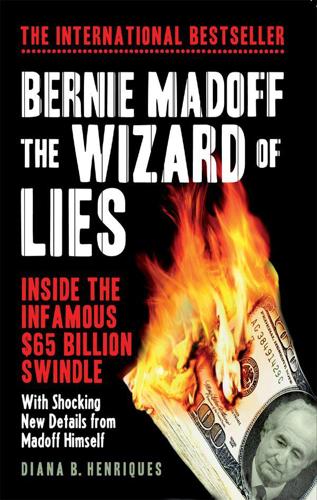
Bernie Madoff, the Wizard of Lies: Inside the Infamous $65 Billion Swindle
by
Diana B. Henriques
Published 1 Aug 2011
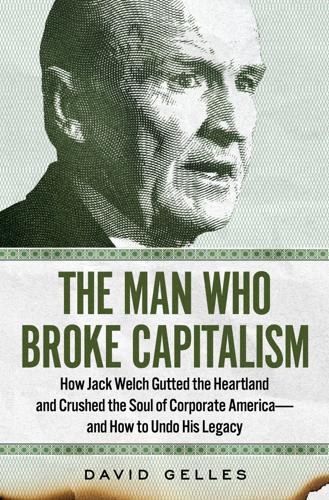
The Man Who Broke Capitalism: How Jack Welch Gutted the Heartland and Crushed the Soul of Corporate America—and How to Undo His Legacy
by
David Gelles
Published 30 May 2022
Securities and Exchange Commission (SEC): accounting fraud suit against Al Dunlap / Sunbeam, 71–72 accounting fraud suit against Kraft Heinz, 181 accounting fraud suit against Under Armour, 182 accounting fraud suit against Waste Management, 124 accounting fraud suits against GE, 126, 147–48, 164–65, 225 cautions about corporate earnings management, 95–96 disclosure of ratio between CEO and median worker salary, 219–20 in the Reagan administration, 39, 65 U.S. Steel, 18, 65 University of Southern California, Leadership Institute, 132 Upwork, 170 USA Today, 194 Vietnam War, 15 Vitality Curve / stack ranking at GE, 4, 44–45, 96–97, 152, 171, 172, 174 Vivendi, 136 Volvo, 83 Wachovia, 149 Walgreens Boots Alliance, 165 Wall Street (1987 film), 57 Wall Street Journal, 18, 74, 107 JW as contributor, 120 Walmart, 171, 178, 184, 199, 214, 217 Warren, Elizabeth, 224 Washington Post, 162–63, 174 Waste Management, 123–24 Watson, Thomas J., 69–70 wealth concentration, 10–12, 183–85 Welch, Jack (JW): books and audiobooks, 117, 131–32, 135, 195, 205–6 as chairman and CEO of GE, 2–3, 4–8, 10, 16–17, 32, 41–50, 75, see also chief executive officers (CEOs) at GE; General Electric (GE) as chairman of the NYC Leadership Academy, 132–33, 134 compensation / personal wealth, 7, 11, 91–92, 118–20, 197–98 death (2020), 11, 192, 193, 220–22 denunciation of shareholder capitalism, 151–52 divorce and remarriage, 117–20, 174 education, 18, 28 as embodiment of shareholder capitalism, 2–3, 4–8, see also shareholder capitalism family background, 16, 27 on the Fiat board, 83 financial crisis of 2008 and, 195–96 GE acolytes / protégés, 9, 77–85, 87–90, 99–113, 127–30, 135, 136–45, 153–54, 160–66, 176, 189–94, 200 in the GE appliances business, 30–31 in the GE plastics division, 28–30 Jack Welch Management Institute (online MBA program), 11, 134–35, 195 legacy of, 8–13, 146–49, 160–66, 220–31 as “Manager of the Century” (Fortune Magazine), 7, 91–97, 114–15, 117, 118–19, 120, 146, 152, 159, 163, 198, 230 as “Neutron Jack” (Newsweek), see “Neutron Jack” partisan politics and misinformation, 53, 156–60, 196–97, 198–99 personality / management style, 17–18, 27–32, 42, 48–49, 72, 76, 107–8 Pierre Hotel speech to analysts (1981), 33–35, 52 post-retirement transformation, 11, 96–97, 116–21, 130–35, 151–52 retirement (2001), 96, 126, 176 as role model, 72–73, 78–80, 81, 88, 111, 123–26, 175, 177–82, 191–94, 229–31 search for successor, 99–104 Six Sigma and, 101 stakeholder capitalism commentary, 151–52 as “Toughest Boss in America” (Fortune), 49 Donald Trump and, 12, 59, 90–91, 121, 134–35, 158, 194–201, 221 Twitter feeds, 157–58, 159–60, 174 virtues of, 84–85 Welch, Suzy Wetlaufer, 117–18, 131–32, 221 Welchism: at Allied Signal, 78–80, 220–21 at Amazon, 134, 171–74, 203 at Boeing, 86–90, 113, 127–30, 153–56, 186–94, 203 chief executive officer role and, 8–9, see also chief executive officers (CEOs) at GE Covid-19 pandemic and, 221–26 critiques of, 70, 72–73, 84–85, 92–97, 104–7, 115–16, 136–39, 147–49, 160–66 Crotonville Management Development Institute / GE University and, 9, 74–77, 133, 191, 192 Darwinian attitude in, 9, 28–29, 33–35, 83, 108 dealmaking in, see dealmaking (generally); dealmaking at GE downsizing in, see downsizing (generally); downsizing at GE end of, at GE, 166 at Fiat SpA, 82–84 financialization in, see financialization (generally); financialization at GE Friedman doctrine as basis of, 3–4, 6–7, 35–40, 93–94, 229 Friedrich Hayek in groundwork for, 35–36, 73, 230 impact in corporate America, 8–13, 175–85, 229 Jack Welch Management Institute (online MBA program) and, 11, 134–35, 195 of JW acolytes / protégés, 9, 77–85, 87–90, 99–113, 127–30, 135, 136–45, 153–54, 160–66, 176, 189–94, 200 JW denunciation of, 151–52 in JW post-retirement transformation, 130–35 at Kraft Heinz, 177, 181, 203, 206–7 legacy of, 8–13, 146–49, 160–66, 220–31 moving beyond, 12–13, 203–31, see also stakeholder capitalism nature of, 8–9 negative externalities in, 168–85 NYC Leadership Academy and, 132–33, 134 Six Sigma in, 101, 112–13, 127 at Stanley Works, 83–84, 110 at 3G Capital, 177–82, 206–7 Trump and, 198–201 see also shareholder capitalism Wells Fargo, 149 Wendt, Gary, 60, 62, 106, 111 West, Allen, 158 Western Asset Mortgage Capital (WMC), 137, 142–43, 165, 225 Westinghouse, 18, 66 Wetlaufer, Suzy, 117–18, 131–32, 221 WeWork, 134, 171 Whitehead, John C., 39 Willis, Earl, 23 Winning (Welch and Welch), 131, 195 Winning: The Answers (Welch and Welch), 131 worker compensation, see employee compensation WorldCom, 125 World Economic Forum, 211–12 World War I, 204 World War II, 18, 22, 86, 183–84 Wriston, Walter, 119–20 Xerox, 18 Yokogawa Medical Systems (Japan), 18–19 Young, Owen D., 23 Zaslav, David, 176, 221 zero-based budgeting (ZBB), 179 Zuckerberg, Mark, 134, 184 Simon & Schuster 1230 Avenue of the Americas New York, NY 10020 www.SimonandSchuster.com Copyright © 2022 by David Gelles All rights reserved, including the right to reproduce this book or portions thereof in any form whatsoever.
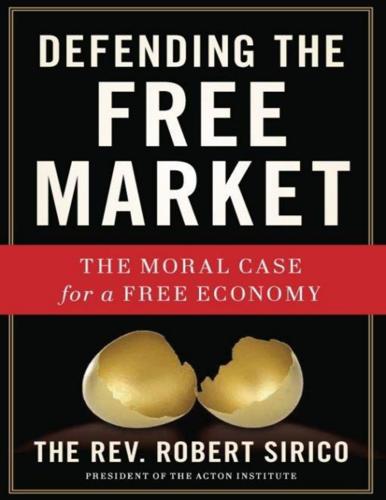
Defending the Free Market: The Moral Case for a Free Economy
by
Robert A. Sirico
Published 20 May 2012
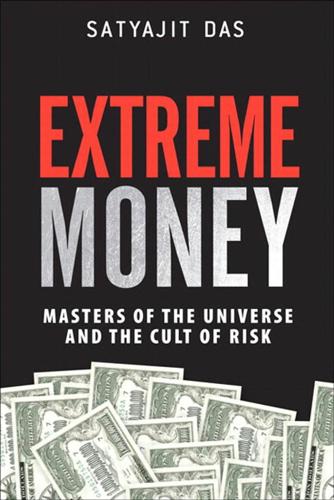
Extreme Money: Masters of the Universe and the Cult of Risk
by
Satyajit Das
Published 14 Oct 2011
People push the limits of physical ability and fear creating a rush as the brain releases dopamine, endorphins, and serotonin to create a temporary feeling of inexplicable euphoria. Money, too, is increasingly an extreme sport. As Gordon Gecko, played by Michael Douglas, tells his son-in-law in Oliver Stone’s Wall Street Money Never Sleeps, the 2010 reprise of the original, it isn’t about the money; it’s about the game! We live and work in the world of extreme money—spectacular, dangerous games with money that create new artificial highs in growth, prosperity, sophistication, and wealth. Once used to value and exchange ordinary goods, money has become the main way to make money.
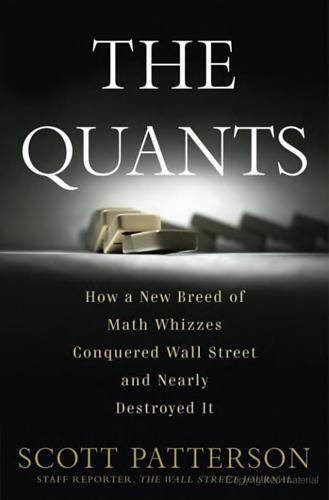
The Quants
by
Scott Patterson
Published 2 Feb 2010
The mood around the country turned decidedly anti–Wall Street as the junk bond scandals hit the front pages of newspapers. An October 1987 Newsweek cover queried, “Is the Party Over? A Jolt for Wall Street’s Whiz Kids.” In December 1987, audiences in movie theaters listened to Gordon Gekko, the slimy takeover artist played by Michael Douglas, proclaim the mantra for the decade in Oliver Stone’s Wall Street: “Greed is good.” A series of popular books reflecting the anti–Wall Street sentiment hit the presses: Bonfire of the Vanities by Tom Wolfe, Barbarians at the Gate by Wall Street Journal reporters Bryan Burrough and John Helyar, The Predators’ Ball by Connie Bruck, Liar’s Poker by Michael Lewis.
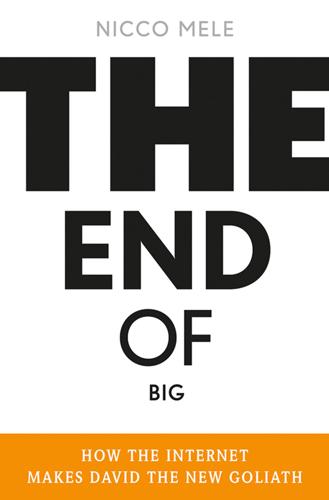
The End of Big: How the Internet Makes David the New Goliath
by
Nicco Mele
Published 14 Apr 2013

Evil Geniuses: The Unmaking of America: A Recent History
by
Kurt Andersen
Published 14 Sep 2020
It’s remarkable how well in 1987 a big Hollywood movie—a movie distributed by the studio Rupert Murdoch had recently acquired—dramatized, in real time, the unashamed new money-money-money American zeitgeist that considered capitalism nothing but awesome. It wouldn’t and couldn’t have been made just a dozen years earlier. The main plot points of Oliver Stone’s Wall Street were spot on: a superstar financial speculator engages in illegal inside trading, a predatory takeover strips a profitable company of its assets, and unionized workers are bamboozled into going along with a deal that will leave them without their good jobs and pensions. The corporate raider Gordon Gekko, played by Michael Douglas, does get his comeuppance in the end because his stockbroker, the Charlie Sheen character who provided him with the tradable inside information about his mechanic father’s airline company, flips on him.
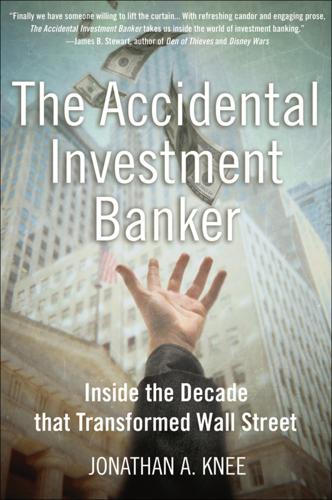
The Accidental Investment Banker: Inside the Decade That Transformed Wall Street
by
Jonathan A. Knee
Published 31 Jul 2006
Why should we be surprised that bankers fell all over each other on the way out of one set of doors and through the other? To be fair, some version of this explanation is by far the most popular not only among the general public, but also among bankers themselves. Yet there is something unsatisfactory about this theory—let’s call it the Greed is Good theory after the famous Michael Douglas line from Oliver Stone’s Wall Street. If the theory were true, it would suggest one could simply get bankers to stay by paying them more. And this is precisely what the major investment banks tried to do. They began gingerly with a variety of “quality-of-life” initiatives that tried to emulate the imagined work environment at Internet companies.
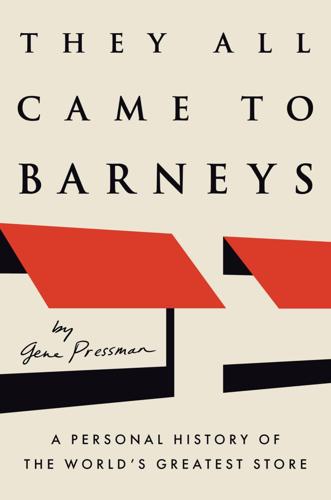
They All Came to Barneys: A Personal History of the World's Greatest Store
by
Gene Pressman
Published 2 Sep 2025
He was Azzedine Pressman. 15 Yuppie City 1985–1986 The Palladium was just one more symbol of a new era in New York, one borne on a raft of new wealth and new interest in the trappings of it: design, art, fashion, excess. The markets were booming. Stocks were up, and corporate raiders were the new antiheroes. The leveraged buyout was invented; so was the junk bond. A new downtown art scene, centered in SoHo, was flush with interest and cash. We were entering the era memorialized in Oliver Stone’s Wall Street, with Gordon Gecko and his decade-defining catchphrase: “Greed is good.” Cash was readily available and it felt like the bubble would never burst. It was no accident that this was a time of major expansion for Barneys, for which we’d buy up the neighboring buildings on Seventh Avenue for an ambitious enlargement and the creation, for the first time, of a stand-alone women’s store.
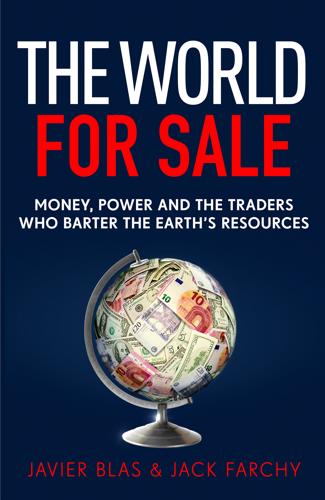
The World for Sale: Money, Power and the Traders Who Barter the Earth’s Resources
by
Javier Blas
and
Jack Farchy
Published 25 Feb 2021
Morgan, 130 J&S, 208 –9 , 210 –11 Jaeggi, Daniel, 211 , 216 Jamaica, 72 –84 , 86 , 98 , 142 , 154 , 204 , 310 Jamalco, 80 James, Greg, 186 , 191 Jamison, David, 155 , 164 Jankilevitsch, Gregory, 208 –9 , 210 –11 , 216 Japan, 13 , 18 , 24 , 28 aluminium trade, 82 atomic bombings (1945), 223 coal consumption, 177 , 183 , 187 , 273 grain consumption, 39 G7 summit (1979), 70 Gulf War (1990–91), 100 oil consumption, 44 reconstruction, 179 , 180 , 223 rice futures, 102 sogo shosha , 13 Sumitomo, 250 supercycles and, 180 Jesselson, Ludwig, 8 , 24 , 25 , 27 , 28 , 35 , 37 , 41 , 326 Iran oil deal (1973), 52 –3 Rich’s resignation (1974), 58 –9 , 121 jets, 184 JOC Oil, 65 –6 Johnson, Lyndon Baines, 43 Jugometal, 29 Kabila, Joseph, 223 –4 , 225 , 227 , 229 Kabila, Laurent-Désiré, 223 Kalmin, Steve, 270 Kardashian, Kim, 152 Kashagan, 297 Katanga, Congo, 219 , 223 , 224 , 226 –9 Katumba Mwanke, Augustin, 224 , 225 , 227 Kazakhstan, 131 , 153 , 165 , 168 , 185 , 199 , 258 , 302 aluminium production, 140 , 141 , 145 , 146 , 147 oil production, 65 , 168 , 206 , 296 –9 Vitol, trade with, 296 –9 wheat production, 245 KazMunaiGas (KMG), 297 Kazzinc, 184 Kelm, Erwin, 38 Kenya, 93 , 232 KGB (Komitet Gosudarstvennoy Bezopasnosti ), 23 Khodorkovsky, Mikhail, 213 –15 , 299 Khomeini, Ruhollah, 67 , 94 , 96 Khrushchev, Nikita, 34 Kingston, Jamaica, 72 –3 , 77 Kinshasa, Democratic Republic of Congo, 33 Kirkuk, Iraq, 280 , 283 –5 , 287 , 289 Klebnikov, Paul, 149 Kleinwort Benson, 277 Klöckner & Co, 114 Klomp, Ton, 206 Knoechel, Eberhard, 258 Koch, Charles and David, 64 , 290 Kolwezi, Congo, 218 , 226 , 227 Krasnoyarsk, Russia, 141 –2 , 145 –6 , 148 Kulibayev, Timur, 298 –9 Kurdistan, 198 , 280 –91 , 295 , 298 , 299 , 302 , 328 Kuwait Gulf War (1990–91), 100 –101 , 106 , 108 –10 , 157 oil crisis, first (1973–4), 54 –5 Rotterdam market trade, 62 Kyrgyzstan, 158 Lada, 86 Lage, Carlos, 152 Lagos, Nigeria, 236 Lakhani, Murtaza, 197 –9 , 202 –3 , 284 Larocca, José, 238 Lay, Kenneth, 173 lead, 35 , 85 , 129 Lebanon, 226 Lehman Brothers, 243 , 265 Leiman, Ricardo, 244 Leopoldville, Belgian Congo, 33 letters of credit, 61 Lew, Jack, 312 Liberia, 308 Libya, 1 –8 , 64 , 92 , 166 , 247 , 283 , 285 Liechtenstein, 46 light-touch regulation, 19 Lilley, David, 195 Linetskiy, Vadim, 211 lithium, 319 Lithuania, 161 , 181 London, England, 3 , 5 , 11 , 20 , 55 , 199 Glencore–Xstrata merger (2012), 272 –3 International Petroleum Exchange, 115 property market, 147 Rotterdam market and, 63 Stock Exchange, 203 telegraph in, 26 Vitol in, 163 London Metal Exchange (LME), 79 –82 , 102 , 123 , 145 , 195 , 251 Louis Dreyfus, 10 , 19 , 39 , 241 , 244 , 248 , 262 , 277 , 320 Loya, Mike, 115 Lualaba river, 218 Lubumbashi, Congo, 33 Luckock, Ben, 285 , 286 Lutter, Gerd, 64 Lvov, Felix, 145 Mabanaft, 31 –4 , 35 –6 , 37 , 56 , 68 , 261 Oiltanking, 63 –4 Soviet deal (1954), 22 –4 , 32 , 33 –4 , 44 , 51 , 135 , 261 , 302 MacLennan, David, 17 , 31 , 231 MacMillan family, 249 , 277 , 278 MacMillan, Harold, 87 MacMillan, John, 25 , 27 , 29 –31 , 38 , 41 , 242 Madrid, Spain, 48 , 58 , 59 , 60 , 123 , 126 Mahoney, Chris, 259 malachite, 226 Mali, 294 Malta, 66 , 286 , 308 Manafort, Paul, 284 Manhattan Project (1942–6), 223 Manley, Michael, 76 –7 , 83 Mao Zedong, 177 Maradona, Diego, 152 Marathon Petroleum, 53 Marc Rich + Co, 14 , 16 , 19 , 20 , 37 , 47 , 59 –61 , 86 –7 , 117 –27 , 143 aluminium trade, 77 –84 , 122 , 125 , 144 , 165 Angola, trade with, 282 , 300 bribery, use of, 310 Cobuco, 91 –4 coup (1993–4), 125 –7 , 184 , 190 Cuba, trade with, 157 –8 Dauphin resignation (1992), 122 foundation of (1974), 59 –61 Glasenberg joins (1984), 182 Granaria acquisition (1981), 245 Hall job offer (1982), 106 indictments (1983), 96 –7 , 130 , 155 Iran, trade with, 68 –9 , 94 –7 Jamaica, trade with, 72 –4 , 77 –84 , 86 , 98 , 142 Nigeria, trade with, 61 oil team resignation (1993), 125 Philipp Bros. collapse (1990), 113 profits, 69 Russia, trade with, 122 South Africa, trade with, 88 , 89 , 90 , 94 , 98 , 122 Soviet Union, trade with, 136 –7 Strothotte resignation (1992), 121 –2 Südelektra stake (1990), 189 Tajikistan, trade with, 162 volume of trade, 293 Weiss resignation (1992), 122 zinc play (1991–2), 122 –4 , 128 , 170 , 251 margin calls, 124 Marimpex, 64 , 89 Marquard & Bahls, 32 Marsa al-Brega, Libya, 5 –6 Marshall Islands, 308 Mashkevich, Alexander, 185 Maté, Daniel, 259 Mayfair, London, 84 , 147 , 199 , 281 , 297 Mayuf, Abdeljalil, 7 McCarthy, Joseph, 22 McIntosh, Ian, 248 Meier, Henri, 127 Menatep, 213 Mercuria, 206 , 207 –9 , 210 –12 , 216 , 261 , 262 , 318 , 324 mercury, 48 Merrill Lynch, 138 Metallgesellschaft, 25 , 114 , 123 , 172 , 195 metals, 9 , 14 , 25 , 26 , 57 aluminium, see aluminium cobalt, 9 , 223 , 224 , 226 , 273 , 314 , 318 , 319 copper, see copper futures, 102 iron ore, 175 –6 , 181 , 261 , 264 lead, 35 , 85 , 129 lithium, 319 mercury, 48 nickel, 137 , 176 , 181 , 265 , 319 zinc, see zinc Mexico, 129 , 130 , 157 , 167 , 180 , 234 , 240 , 273 , 312 MG, 172 , 195 Milosevic, Slobodan, 167 Minerals & Chemicals Corporation, 276 mining, 85 , 171 , 186 –94 , 326 in Australia, 175 –6 , 186 –7 in Congo, 218 –29 Mistakidis, Telis, 194 , 259 , 270 , 272 Mitterrand, François, 161 Mobil, 170 Mobutu Sese Seko, 223 Model T car, 253 Mohammad Reza Pahlavi, Shah of Iran, 46 , 50 , 67 , 88 , 67 Mombasa, Kenya, 93 Monaco, 63 Mongolia, 140 Monte Carlo, 144 Morgan Stanley, 13 , 102 , 111 , 155 Morocco, 33 , 47 Morrison, James, 68 Mosaic, 278 Mosul, Iraq, 283 Mount Holly, South Carolina, 81 Mount Isa, Queensland, 193 –4 Mountstar Metals, 138 Mozambique, 161 Murray, Simon, 269 Muscat, Oman, 153 Mutanda, Congo, 219 , 223 , 224 , 226 –9 Namibia, 232 , 233 do Nascimento, Leopoldino Fragoso, 229 Nasmyth, Jan, 55 Nasser, Gamal Abdel, 45 –6 National Iranian Oil Company, 52 , 68 –9 Nazarbayev, Nursultan, 297 –8 Nazi Germany (1933–45), 22 , 24 , 26 , 47 , 87 Nebuchadnezzar, King of Babylon, 284 Netherlands, 48 , 65 , 120 , 163 , 164 , 236 , 237 , 243 Neverland , 286 New Comfort , 323 New Mexico, United States, 323 New York, United States Aluminum for Defense, 75 Great Grain Robbery (1972), 38 –42 Jesselson in, 24 , 28 Rich in, 37 , 47 , 58 Rotterdam market and, 63 telegraph in, 26 Weisser in, 35 New York Mercantile Exchange (Nymex), 104 Newfoundland, Canada, 170 Nicaragua, 77 , 85 , 87 , 161 nickel, 137 , 176 , 181 , 265 , 319 Nigeria, 85 , 181 , 220 , 232 , 325 Alison-Madueke corruption (2011–15), 221 Elf, trade with, 61 Glencore, trade with, 12 , 168 , 314 jihadis in, 294 Probo Koala affair (2006), 236 rice consumption, 232 Rotterdam market trade, 62 Trafigura, trade with, 130 Vitol, trade with, 166 Nixon, Richard, 51 , 254 Noble Group, 196 , 244 , 262 , 276 –7 Non-Aligned Movement, 92 North Dakota, United States, 261 , 323 North Korea, 138 , 162 North Sea oil, 114 –16 , 122 , 123 , 204 , 316 NRC Handelsblatt, 65 O’Malley, Tom, 53 , 61 , 113 Obama, Barack, 311 , 320 Och-Ziff Capital Management, 228 October War (1973), 53 Ognev, Yury, 246 Ohio, United States, 285 oil Brent oilfield, 114 –16 , 122 , 123 , 204 , 316 Chad trade, 294 –6 Chinese trade, 179 –80 , 201 coronavirus pandemic (2019–), 15 , 321 –5 crisis, first (1973–4), 53 –7 , 62 , 67 , 69 , 88 , 104 , 105 , 163 crisis, second (1979), 18 , 67 –9 , 92 , 104 Cuban trade, 151 –3 , 156 –61 Gulf War (1990–91), 100 –101 , 106 , 108 –10 Iraq trade, 197 –203 , 207 , 210 , 280 –91 Israel pipeline, 43 , 45 , 46 –7 , 49 –51 , 94 , 285 –6 Kazakhstan trade, 296 –9 Kurdistan trade, 280 –91 optionality, 205 –6 Romanian trade, 167 –9 Rotterdam market, 62 –6 Russian trade, 9 , 65 , 199 , 206 –17 , 287 , 300 –303 , 313 , 319 Seven Sisters, see Seven Sisters South African trade, 87 –91 , 94 , 98 Soviet trade, 22 –4 , 32 , 33 –4 , 44 , 51 , 66 , 156 –7 , 165 United States trade, 317 ‘Oil Crisis, The’ (Akins), 52 Oilflow SPV I DAC, 281 –2 , 287 –90 , 292 oilseeds, 9 , 39 Oiltanking, 64 Old Testament, 284 Olympic Games, 78 , 87 –8 , 182 Oman, 64 , 116 , 153 , 166 , 199 onions, 252 Onsan, South Korea, 324 Operation Desert Storm (1991), 110 optionality, 205 –6 options, 101 –2 , 103 , 110 , 116 , 123 Organisation for Economic Co-operation and Development (OECD), 106 , 275 Organization of the Petroleum Exporting Countries (OPEC), 44 –5 , 53 , 62 –3 , 67 , 114 Cobuco and, 92 , 93 coronavirus pandemic (2019–), 322 Iraq surcharges and, 200 –201 oil crisis, first (1973–4), 53 –7 , 62 , 67 , 69 , 88 , 105 , 163 oil crisis, second (1979), 68 South Africa embargo (1973), 88 World OPEC project (1988), 116 Ortega, Daniel, 87 Otto, Nikolaus, 253 Oxfam, 250 Oxford University, 105 , 147 , 154 Page, Gregory, 278 Palm Jumeirah, Dubai, 288 Panama, 46 , 201 , 308 paper barrels, 102 , 103 Paribas, 60 –61 , 95 Parque Central hotel, Havana, 151 –3 , 160 –61 Pauli, Heinz, 127 Pax Americana, 24 , 180 Peakville Limited, 201 Pechiney, 171 Pelosi, Nancy, 249 Pemex, 234 –5 Pennsylvania, United States, 280 , 281 , 290 pension funds, 102 , 131 , 269 , 271 , 278 , 280 –82 , 288 , 290 , 295 PepsiCo, 137 perestroika , 135 Perkins, Ian, 187 Permian basin, 323 Peru, 85 , 130 , 226 , 264 Peshmerga, 283 Pestalozzi, 19 Pestalozzi, Peter, 19 Peterson, Tor, 259 Petra, 64 Petraco, 287 Petrobras, 313 petrodollars, 56 , 57 , 67 , 70 , 200 , 288 Phibro Energy, 100 –101 , 106 –10 , 111 , 113 , 194 Phibro-Salomon, 112 –13 Philipp, Julius, 25 , 26 , 37 Philipp Brothers, 14 , 24 , 25 , 26 , 28 –9 , 34 –5 , 56 , 57 , 61 , 98 , 186 apprenticeships, 37 copper trade, 195 East Germany, trade with, 29 Gulf War (1990–91), 100 –101 , 107 –10 Hall joins (1982), 106 Hong Kong office, 196 Iran oil deal (1973), 52 –3 , 55 Israel pipeline trade, 49 –51 , 94 , 285 metals trade, 28 –9 , 34 –5 , 49 , 57 , 76 , 113 Mineral & Chemicals merger (1960), 276 Phibro Energy, 100 –101 , 106 –10 , 111 , 113 Phibro-Salomon merger (1981), 112 , 316 profits, 38 , 69 , 163 Rich’s resignation (1974), 57 –9 , 121 secrecy, 276 Socar’s acquisition (2015), 319 Soviet Union, trade with, 29 , 135 , 137 Yugoslavia, trade with, 28 , 29 Philippines, 86 , 241 Piercy, George, 54 Pinochet, Augusto, 87 Pittsburgh, Pennsylvania, 36 Pojdl, Pavel, 211 Poland, 208 pollution, 21 , 318 Posen, Danny, 48 , 120 , 128 , 162 Posen, Felix, 37 , 47 , 135 , 137 , 183 , 274 potatoes, 104 Probo Koala , 236 , 238 Public Employees’ Retirement Systems, 280 , 290 , 295 public relations (PR), 278 Puerto Rico, 91 Puma Energy, 230 put options, 188 Putin, Vladimir, 9 , 147 , 208 , 212 –15 , 299 –303 , 313 , 328 PVM, 65 Q book, 171 Qaboos bin Said, Sultan of Oman, 64 , 153 , 166 al-Qaeda, 294 Qatar, 2 , 5 , 6 , 7 , 272 –3 , 301 –2 Querub, Isaac, 123 , 126 Ramadi, Iraq, 283 Ramaphosa, Cyril, 185 Ras Lanuf, Libya, 5 –6 Raznoimport, 135 , 137 , 139 , 162 Reagan, Ronald, 77 Red Kite, 195 Red Scare (1947–57), 22 Reid, Trevor, 191 Republic of the Congo, 314 Reuben College, Oxford, 147 Reuben, David, 133 –5 , 137 –47 , 207 –8 Reuben, Simon, 147 Reynolds, 80 Rhodesia (1965–79), 309 rice, 102 , 177 , 232 Rice, Condoleezza, 224 Rich, Denise, 98 , 120 Rich, Marc, 14 , 20 , 45 , 46 –53 , 68 , 70 , 86 –7 , 117 –27 , 305 , 327 bribery, use of, 310 Cobuco, 91 –4 coup (1993–4), 125 –7 , 184 , 190 Dauphin resignation (1992), 122 death (2013), 325 divorce (1996), 120 early rising, 185 FBI Most Wanted status, 95 Glasenberg, relationship with, 183 indictment (1983), 96 –7 , 130 , 155 Iran, trade with, 52 –3 , 55 , 68 –9 , 94 –7 Israel pipeline trade, 49 –51 , 94 , 285 Jamaica, trade with, 72 –4 , 77 –84 , 86 , 98 knife analogy, 60 , 98 , 156 , 309 , 327 Marc Rich + Co, foundation of (1974), 59 –61 oil team resignation (1993), 125 pardoning (2001), 97 –8 politics, views on, 290 resignation from Philipp Bros. (1974), 57 –9 , 121 South Africa, trade with, 88 , 89 , 90 , 94 , 98 Strothotte resignation (1992), 121 –2 Weiss resignation (1992), 122 zinc play (1991–2), 122 –4 Rio Tinto, 273 , 274 Roche, 127 , 188 –92 , 267 Rockefeller, John, 32 Rolling Stones, The, 127 Roman Empire (27 BCE – CE 476), 252 Romania, 129 , 153 , 167 –9 Rommel, Erwin, 5 Rosenberg, David, 122 –4 Rosneft, 9 , 214 –16 , 287 , 300 –303 , 313 , 319 Rotterdam market, 62 –6 , 70 , 164 Rotterdam, Netherlands, 62 , 63 , 64 , 70 , 82 , 145 Roundhead, 201 Royal Dutch Shell, 13 , 32 , 54 , 64 , 115 , 154 , 165 , 171 –2 Rubin, Robert, 194 Rusal, 148 Russian Federation, 9 , 14 , 17 , 122 , 131 , 273 , 299 –302 aluminium trade, 133 –5 , 139 –50 animal feed trade, 261 coronavirus pandemic (2019–), 322 Crimea annexation (2014), 300 food price crisis (2007–8), 239 emerging market status, 17 , 180 Iraq, trade with, 200 , 287 oil trade, 9 , 65 , 199 , 206 , 207 –17 , 287 , 299 –302 , 303 Rosneft, 9 , 214 –16 , 287 , 300 –303 , 313 , 319 sanctions on, 300 –303 , 312 sovereign debt default (1998), 169 wheat production, 245 –7 Salomon, 113 Salomon Brothers, 69 , 108 , 112 , 316 Salvador, El, 161 Samoa, 144 sanctions, 86 , 309 , 311 –13 , 320 BNP Paribas and, 304 –8 on Cuba, 9 , 152 , 305 –8 on Deripaska, 312 on Gertler, 225 , 312 –13 on Iran, 305 , 309 , 312 , 320 –21 on Iraq, 197 –203 , 207 , 210 , 310 on Russia, 300 –303 , 312 secondary sanctions, 311 –12 on South Africa, 64 , 87 –90 , 93 , 182 , 183 , 308 , 309 on Sudan, 305 on Venezuela, 312 on Yugoslavia, 167 on Zhuhai Zhenrong, 320 dos Santos, José Eduardo, 229 Sarir–Tobruk pipeline, 6 Saudi Arabia, 36 , 181 Aramco, 51 –2 , 319 barley consumption, 241 Gulf War (1990–91), 109 oil crisis, first (1973–4), 54 –5 oil crisis, second (1979), 68 OPEC established (1960), 44 Rotterdam market trade, 62 South Africa, trade with, 88 World OPEC project (1988), 116 Saunders, Walter ‘Barney’, 38 Sayanogorsk, Russia, 148 Schönenberg club, Switzerland, 184 Schwab, Muriel, 326 Scotland, 291 Seaga, Edward, 77 Sechin, Igor, 9 , 300 –302 secondary sanctions, 311 –12 Semlitz, Stephen, 111 Senegal, 33 , 222 , 240 September 11 attacks (2001), 190 –91 Serbia, 167 Seven Sisters, 17 , 32 –3 , 44 , 49 , 51 –2 , 66 , 70 , 101 , 105 , 170 , 319 oil crisis, first (1973–4), 56 , 61 –3 , 134 Shapiro, John, 111 Sharp, Graham, 125 , 128 , 129 , 170 Shear, Neal, 111 Sheffield, Scott, 323 Shell, see Royal Dutch Shell Shetland Islands, 114 Shipping Research Bureau, 89 Siberia, Russia, 79 , 131 , 140 , 141 , 208 , 210 , 214 Singapore, 19 , 91 , 154 , 322 Sirte, Libya, 6 Skilling, Jeffrey, 173 Small, Hugh, 83 Smith, Adam, 16 Smolokowski, Wiaczeslaw, 208 –9 , 210 –11 , 216 Socar, 319 Société Générale, 95 Somalia, 309 Soros, George, 262 South Africa, 14 , 48 , 181 –2 apartheid, 64 , 87 –90 , 93 , 182 , 183 , 308 , 309 coal trade, 186 , 187 , 191 , 192 ferrochrome trade, 190 gold trade, 232 oil trade, 64 , 87 –91 , 93 , 94 , 98 , 122 , 182 –3 , 220 , 308 South Carolina, United States, 281 South Korea, 183 , 321 , 324 South Sudan, 284 , 289 Soviet Union (1922–91), 9 , 133 –50 Cargill, trade with, 31 , 38 –42 , 135 collapse (1991–2), 17 , 133 –5 , 139 –50 , 151 –3 , 161 , 165 , 207 , 208 Cuba, trade with, 151 , 152 , 153 , 156 Deuss deal (1976), 66 Exportkhleb, 38 , 135 Great Grain Robbery (1972), 38 –42 , 57 , 69 , 135 , 310 Jamaica, relations with, 77 , 86 Mabanaft, trade with, 22 –4 , 32 , 33 –4 , 44 , 51 , 135 , 261 , 302 Marc Rich + Co, trade with, 136 –7 Marimpex, trade with, 64 nuclear weapons, 141 perestroika (1985–91), 135 Philipp Brothers, trade with, 29 , 135 , 137 Raznoimport, 135 , 137 , 139 , 162 Soyuznefteexport, 23 , 34 , 35 , 65 , 135 Vitol, trade with, 165 soybeans, 114 , 181 , 240 , 318 Soyuznefteexport, 23 , 34 , 35 , 65 , 135 Spain, 97 , 98 spot markets, 68 , 70 , 84 , 93 , 94 , 109 , 251 St Moritz Hotel, New York, 35 stagflation, 56 Staley, Warren, 231 , 253 Standard Oil, 32 steamships, 25 Strait of Malacca, 323 Strategic Fuel Fund, 89 Strothotte, Willy, 98 , 120 , 131 –2 , 274 IPO (2011), 258 Jamaica, trade with, 72 –4 , 78 , 80 , 83 , 142 jet, 184 Marc Rich coup (1993), 124 –7 , 184 Marc Rich resignation (1992), 121 –2 Mount Isa Mines deal (2002), 193 –4 Roche, relations with, 188 Russia, trade with, 146 step back (2002), 185 , 187 Xstrata and, 191 –2 Sucres et Denrées, 114 , 159 Sudan, 206 , 284 , 289 , 305 Südelektra, 189 –91 Suez Canal, 36 , 43 , 45 –6 , 53 , 168 sugar, 9 , 57 , 114 , 156 –60 sulphur, 104 , 168 , 232 , 234 , 235 Sumitomo, 250 Sun, 116 Sunday Times, The , 50 , 271 supercycle, 180 –81 , 185 , 196 , 216 Africa and, 219 , 232 China and, 193 , 240 , 245 food prices and, 240 , 248 optionality and, 206 Suriname, 154 Sweden, 209 Switzerland, 7 , 8 , 11 , 12 , 14 , 55 corruption in, 20 , 69 , 310 Glencore in, 170 , 185 , 257 Iran, trade with, 95 light-touch regulation, 19 Marc Rich in, 20 , 58 –60 , 63 , 73 , 95 , 96 , 117 , 124 Trans-Asiatic Company, 46 Vitol in, 160 , 163 , 164 syphilis, 48 Syria, 8 , 45 , 53 , 248 , 283 Tajikistan, 162 Tangier, Morocco, 33 tantalum, 223 Tanzania, 232 Tarasov, Artem, 136 –7 , 139 Tashkent, Uzbekistan, 140 –41 taxation, 21 avoidance, 149 , 201 , 213 –14 , 281 bribes and, 69 , 310 ethanol industry and, 253 , 254 spinning, 115 Rich and, 20 , 95 –7 Switzerland and, 117 Vitol and, 21 Taylor, Cristina, 154 Taylor, Ian, 10 , 14 , 153 –6 , 164 , 165 –6 , 291 , 293 , 321 Conservative Party donations, 290 Cuba, trade with, 151 –3 , 156 –61 death (2020), 325 Enron bid (2001), 173 Kurdistan, trade with, 291 Libya, trade with, 1 –8 , 166 Nigeria, trade with, 166 oil peak prediction, 318 Russia, trade with, 165 , 300 telegraph, 25 Templeton, Franklin, 282 , 290 Tendler, David, 28 , 112 , 113 , 277 , 316 Texaco, 170 Texas, United States, 36 , 104 , 261 , 323 , 325 Thailand, 232 Thomajan, Robert ‘Bob’, 120 –21 Tiku, Arvind, 298 –9 Timchenko, Gennady, 209 , 212 , 214 , 216 , 300 , 313 tin, 102 Titan Oil Trading, 299 Tito, Josip Broz, 29 Titusville, Pennsylvania, 32 TNK-BP, 300 , 301 Tobruk, Libya, 3 , 6 Törnqvist, Torbjörn, 20 , 209 , 212 , 214 –16 , 230 , 313 , 327 Total, 61 , 170 toxic waste, 233 –8 , 304 Tradax International, 30 , 41 , 242 Trafford, John, 60 , 61 Trafigura, 11 , 14 , 59 , 87 , 119 , 129 –30 , 170 , 174 , 318 Angola, trade with, 229 –30 BNP Paribas, relations with, 304 –8 , 312 bonds, 261 bribery, use of, 314 , 315 coronavirus pandemic (2019–), 324 Cuba, trade with, 159 , 306 –8 foundation (1993), 129 –30 IPO, views on, 277 Iraq, trade with, 201 , 203 , 285 –6 , 287 Jamaica, trade with, 310 Kurdistan, trade with, 285 –6 , 287 profits, 249 public relations (PR), 278 Texas terminal, 261 toxic waste scandal (2006), 233 –8 , 304 volume of trade, 293 women in, 15 Trans-Asiatic Company, 46 Trans-World Group, 134 , 137 –49 , 165 , 208 Transamine, 35 Transol, 63 Transworld Oil, 66 , 89 , 95 , 114 –16 Trump, Donald, 97 , 284 , 317 Tselentis Mining, 186 Tunisia, 247 de Turckheim, Eric, 87 , 125 , 128 , 129 , 306 Turkey, 66 , 180 , 285 Turkmenistan, 161 , 165 twelve apostles, 131 20th Century Fox, 96 Ukraine, 136 , 140 , 162 , 300 , 310 –11 Unipec, 320 United Arab Emirates (UAE), 46 , 116 , 199 , 262 , 281 , 288 , 319 United Kingdom Brent oilfield, 114 –16 , 122 , 123 , 204 , 316 Cargill in, 243 corruption in, 20 , 311 Financial Services Authority (FSA), 250 FTSE 100 index, 15 , 269 , 276 , 278 , 282 Glencore-Xstrata merger (2012), 271 –3 G7 summit (1979), 70 Libyan Civil War (2011), 1 –8 pension funds, 269 , 278 Scottish independence referendum (2014), 291 shareholder spring (2012), 271 Suez Crisis (1956), 36 Tarasov in, 136 –7 United Nations Convention against Corruption, 275 Iraq sanctions, 101 , 198 , 200 , 201 , 202 sanctions, use of, 309 South Africa sanctions, 88 , 183 , 309 World Food Programme, 240 Yugoslavia sanctions, 167 United States Afghanistan War (2001–14), 311 BNP Paribas prosecution (2014), 304 –8 , 312 , 314 Central Intelligence Agency (CIA), 43 , 76 , 316 China trade war (2017–), 317 –18 Cuba sanctions, 152 , 305 –8 dollar, 311 ethanol production, 254 –5 Foreign Corrupt Practices Act (1977), 310 gold standard abandonment (1971), 51 G7 summit (1979), 70 Helms–Burton Act (1996), 160 Iran hostage crisis (1979–81), 20 , 94 , 96 Iraq War (2003–11), 201 , 283 , 311 Manhattan Project (1942–6), 223 oil production, 317 , 323 Operation Desert Storm (1991), 110 Pax Americana, 24 , 180 pension funds, 131 , 280 –82 , 288 , 290 potato futures default (1976), 104 Red Scare (1947–57), 22 Rich indictment (1983), 96 –7 , 130 Russia sanctions, 300 –303 sanctions, use of see sanctions, secondary sanctions, 311 –12 September 11 attacks (2001), 190 –91 supercycles and, 180 Watergate scandal (1972–4), 254 , 309 Zhuhai Zhenrong sanctions, 320 University of Southern California, 182 University of Witwatersrand, 182 Urals, Russia, 168 uranium, 223 Uzbekistan, 140 –41 , 162 Vale, 264 –5 , 269 Valium, 127 value-at-risk, 195 Vanol, 63 Varsano, Serge, 159 Venezuela, 20 , 34 , 44 , 73 , 154 , 157 , 199 , 312 , 314 very large crude carriers (VLCCs), 107 –8 Vidal, Edmundo, 129 Vienna, Austria, 53 , 54 , 200 Vietnam, 43 , 241 , 261 Viëtor, Henk, 163 Vishnevskiy, Igor, 148 , 149 –50 , 162 Viterra, 273 –4 Vitol, 14 , 162 –6 , 174 , 262 , 318 African petrol stations investment (2011), 261 bribery, use of, 314 Cuba, trade with, 151 –3 , 156 –61 , 306 Enron bid (2001), 173 Euromin, 143 , 165 IPO, views on, 277 Iran, trade with, 166 , 309 Iraq, trade with, 201 , 203 , 285 , 286 –7 , 291 , 310 Jamaica, trade with, 154 Kazakhstan, trade with, 296 –9 Kurdistan, trade with, 285 , 286 –7 , 291 Libya, trade with, 1 –8 , 166 , 283 , 285 Newfoundland refinery loss (1997), 170 Nigeria, trade with, 166 profits, 163 , 248 , 249 Russia, trade with, 143 , 165 , 300 , 301 shareholders, 19 Singapore, trade with, 155 South Africa, trade with, 88 Soviet Union, trade with, 165 tax avoidance, 21 women in, 15 Viëtor split (1976), 163 –4 volume of trade, 293 Vonk’s retirement (1995), 166 Yugoslavia, trade with, 167 Vodafone, 278 Voest-Alpine, 114 Volcker, Paul, 201 Volga-Urals basin, 34 Vonk, Ton, 165 , 166 Wall Street, 13 , 15 , 24 , 47 , 84 , 119 , 130 , 274 financialisation, 102 oil trade, 111 –12 , 114 supercycles and, 196 Wall Street (1987 film), 65 Watergate scandal (1972–4), 254 , 309 Waxman, Henry, 98 Weinberg, Morris ‘Sandy’, 97 Weinstein, Harvey, 20 Weir, Jeremy, 277 , 301 , 315 Weiss, Manny, 77 , 80 –82 , 120 , 121 , 125 , 142 , 145 Weisser, Alberto, 241 Weisser, Theodor, 25 , 27 , 31 –2 , 33 , 37 , 41 , 42 , 63 , 261 Soviet deal (1954), 22 –4 , 32 , 33 –4 , 44 , 51 , 135 , 261 , 302 Wen Jiabao, 239 –41 West Germany (1949–90), 22 –4 , 70 West Virginia, United States, 281 , 295 West, Kanye, 152 Weyer, Christian, 60 –61 wheat, 30 , 31 , 39 –41 , 56 , 232 , 239 –41 , 245 –7 Williams, Edward Bennett, 97 Wimar, 299 Woertz, Patricia, 254 –5 women, 15 World Bank, 80 , 85 , 294 , 303 World Food Programme, 240 World Trade Organization (WTO), 178 , 196 , 317 World War II (1939–45), 5 , 16 , 17 , 22 , 27 , 28 , 31 –2 , 47 , 87 Wyatt, Oscar, 64 , 110 , 200 , 203 Wyler, Paul, 187 , 275 , 311 Xstrata, 175 –6 , 178 , 181 , 189 –94 , 263 –73 , 276 , 301 Glencore coal mines deal (2001–2), 191 –2 Glencore merger, 264 –5 , 267 , 269 –73 Vale bid (2007), 264 –5 , 269 Yamani, Ahmed Zaki, 36 , 54 –5 Yang Qinglong, 320 Yeltsin, Boris, 147 , 213 Yemen, 168 , 206 , 247 Yom Kippur War (1973), 53 Yugoslavia (1945–92), 28 , 29 , 167 , 309 Yukos, 213 –15 , 299 Zak, Zbynek, 117 –18 , 124 , 130 , 278 –9 Zambia, 85 , 226 , 232 Zhuhai Zhenrong, 320 , 327 Zimbabwe, 220 , 230 –32 zinc, 35 , 81 , 85 , 129 Asturiana de Zinc, 123 , 191 Glencore, 258 , 273 Marc Rich play (1991–2), 122 –4 , 128 , 170 , 251 Russian production, 135 , 165 Zug, Switzerland, 58 , 59 , 60 , 63 , 73 , 95 , 96 , 117 , 124 , 182 , 183 THIS IS JUST THE BEGINNING Find us online and join the conversation Follow us on Twitter twitter.com/penguinukbooks Like us on Facebook facebook.com/penguinbooks Share the love on Instagram instagram.com/penguinukbooks Watch our authors on YouTube youtube.com/penguinbooks Pin Penguin books to your Pinterest pinterest.com/penguinukbooks Listen to audiobook clips at soundcloud.com/penguin-books Find out more about the author and discover your next read at penguin.co.uk Cornerstone UK | USA | Canada | Ireland | Australia New Zealand | India | South Africa Cornerstone is part of the Penguin Random House group of companies whose addresses can be found at global.penguinrandomhouse.com .
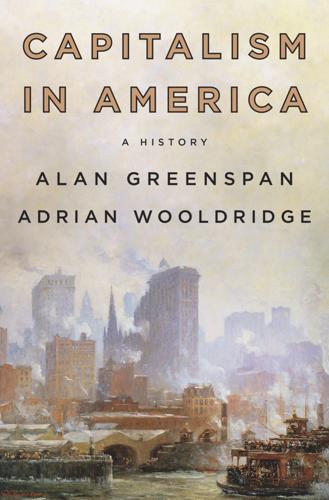
Capitalism in America: A History
by
Adrian Wooldridge
and
Alan Greenspan
Published 15 Oct 2018
THE FINANCIAL REVOLUTION Ronald Reagan inaugurated the most exuberant era on Wall Street since the 1920s. Financiers became national celebrities. Investment banks sucked in the country’s jeunesse dorée with a promise of instant riches and a glamorous life. Books such as The Bonfire of the Vanities (1987) by Tom Wolfe and Liar’s Poker (1989) by Michael Lewis, as well as films such as Oliver Stone’s Wall Street (1987), glamorized life on the Street even as they pretended to demonize it. A tidal wave of money poured into various financial instruments as the economy expanded and people entrusted their retirement savings to the market. Meanwhile, the range and variety of those instruments expanded as financiers applied their brainpower to squeezing better returns out of their investments.
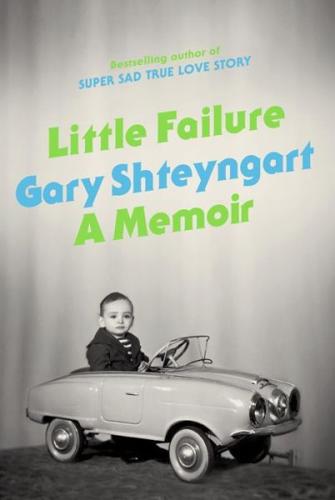
Little Failure: A Memoir
by
Gary Shteyngart
Published 7 Jan 2014
Wearing my OP grandmother shirt, I walk through parklike Stuyvesant Square, sweaty-palmed and scared. I know I cannot be Gary Gnu any longer, but then what will I be? A serious, hardworking Republican boy bound for Harvard, Yale, or, in the worst scenario, Princeton. That’s me. I’ll be funny only when it’s called for. No more clowning around. I’ll keep my mouth shut. I have just seen Oliver Stone’s Wall Street with my family, and the lessons were clear. Don’t trust outsiders. Don’t get caught. Focus only on wealth creation. Greed is good. I also think I have a trump card: the $280,000 colonial my family has just bought in Little Neck. Packed in my school bag, just in case, I carry an engineer’s report testifying to our new house’s value, including a photograph of the house in the morning sun, its southern exposure swaddled by a row of hyacinths.
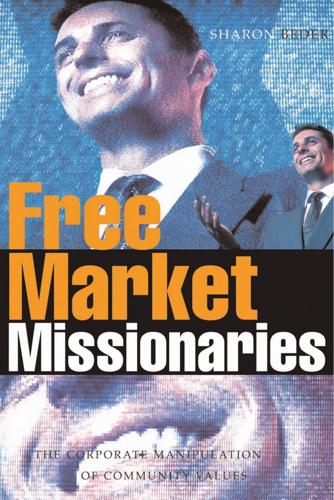
Free Market Missionaries: The Corporate Manipulation of Community Values
by
Sharon Beder
Published 30 Sep 2006
This meant, he argued, that the rise of share ownership, even when through pension funds, had shifted the political balance in favour of pro-business policies: ‘Hypothetically, as workers accumulate capital, their support for free-market and pro-growth policy reforms will increase. The available evidence suggests that this is precisely the case.’19 The Wall Street Journal claims that the 1980s’ criticism of greed, shown in Oliver Stone’s movie Wall Street, had disappeared by the 1990s as everyone indulged in share ownership: Today, even our lowest earners see that the Decade of Greed and its blockbuster sequel, the 1990s, have benefited just about everyone. Workers nowadays don’t have time to hate Gekko, or his 1990s equivalents . . .
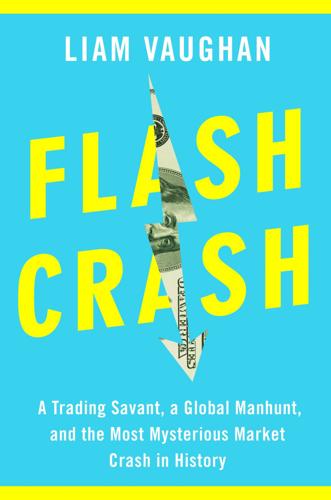
Flash Crash: A Trading Savant, a Global Manhunt, and the Most Mysterious Market Crash in History
by
Liam Vaughan
Published 11 May 2020
Traders in a pure prop firm trade for a firm-wide account and the profits are divvied up by management, whereas in an arcade they trade for their own account and hand over a percentage of their profits. a small sum on each trade: The life cycle of a trade is actually two transactions—a trader buys some futures then sells the same number to close out their position or vice versa. Thus the term “round-trip.” Wall Street: Directed by Oliver Stone (Los Angeles: 20th Century Fox, 1987). Trading Places: Directed by John Landis (Los Angeles: Paramount Pictures, 1983). “rude manners”: Wikipedia entry on “Royal Exchange, London.” “Day One Traders”: Special thanks to John Sussex, whose firsthand account of his experiences in the Liffe pits, recounted in the excellent Day One Trader: A Liffe Story (New Jersey: John Wiley & Sons, 2009), proved invaluable.
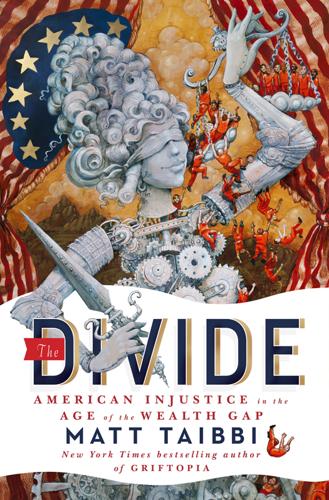
The Divide: American Injustice in the Age of the Wealth Gap
by
Matt Taibbi
Published 8 Apr 2014
Fun fact: When the economy crashed in 2008, the federal government formed an investigatory group to look into the causes. That Financial Crisis Inquiry Committee was given a budget of $9.8 million. Committee chairman Phil Angelides acidly noted that this was “roughly one-seventh of the budget of Oliver Stone’s Wall Street: Money Never Sleeps.” Meanwhile, that same year the federal drug enforcement budget leaped from $13.275 billion to $15.278 billion. That meant that just the increase in the national drug enforcement budget for the year of the biggest financial crisis since the Depression was roughly two hundred times the size of the budget for the sole executive branch effort at formally investigating the causes of financial corruption.
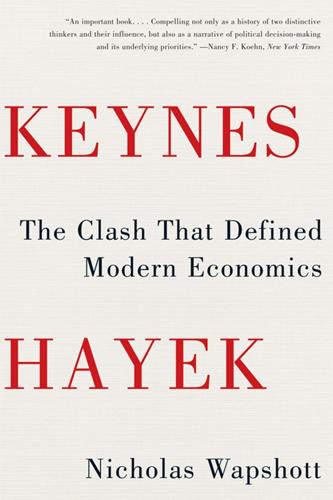
Keynes Hayek: The Clash That Defined Modern Economics
by
Nicholas Wapshott
Published 10 Oct 2011
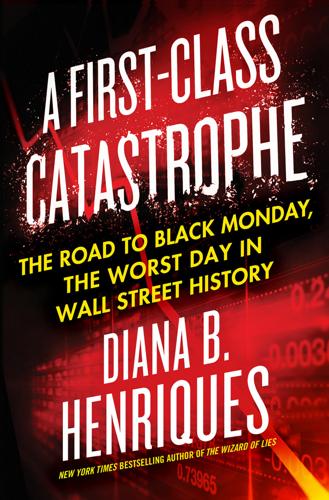
A First-Class Catastrophe: The Road to Black Monday, the Worst Day in Wall Street History
by
Diana B. Henriques
Published 18 Sep 2017
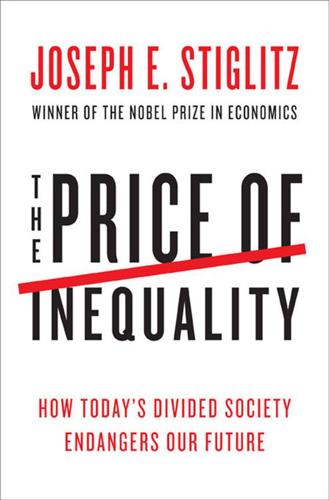
The Price of Inequality: How Today's Divided Society Endangers Our Future
by
Joseph E. Stiglitz
Published 10 Jun 2012
Phil Angelides, who headed the Financial Crisis Inquiry Commission into the causes of the crisis, noted that “today the rate of federal prosecutions for financial fraud is less than half of what it was” during the savings and loan crisis. He also noted that his budget for investigating the crisis, including the misdeeds of the banks, was $9.8 million—roughly one-seventh of the budget of Oliver Stone’s Wall Street: Money Never Sleeps. See “Will Wall Street Ever Face Justice,” New York Times, March 2, 2012, available at http://www.nytimes.com/2012/03/02/opinion/will-wall-street-ever-face-justice.html (accessed March 6, 2012). See W. K. Black, K. Calavita, and H. N. Pontell, “The Savings and Loan Debacle of the 1980s: White-Collar Crime or Risky Business?
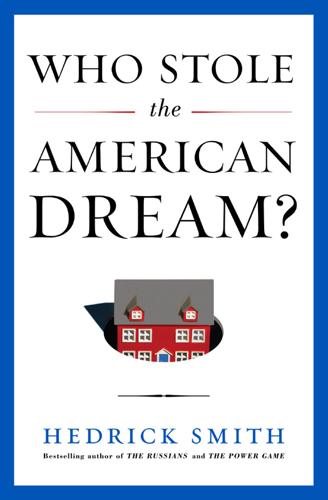
Who Stole the American Dream?
by
Hedrick Smith
Published 10 Sep 2012
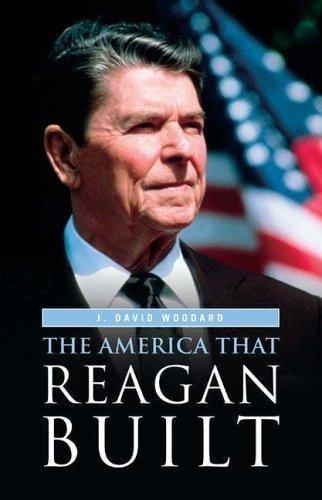
The America That Reagan Built
by
J. David Woodard
Published 15 Mar 2006
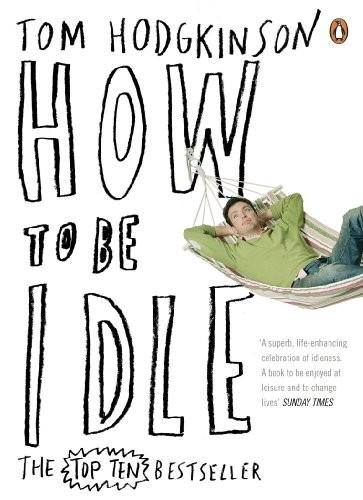
How to Be Idle
by
Tom Hodgkinson
Published 1 Jan 2004
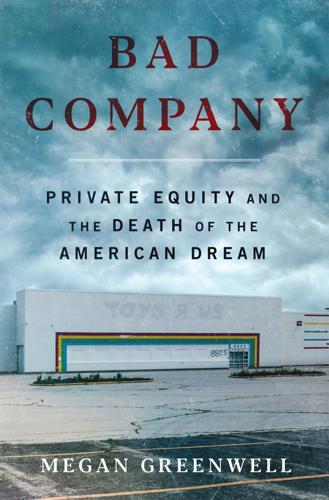
Bad Company
by
Megan Greenwell
Published 18 Apr 2025
When PBS NewsHour ran a mildly critical segment about private equity’s growing dominance in 2010, the CEO of the Private Equity Council reacted with outrage in a letter: “You don’t report that Toys R Us was saved from likely bankruptcy by PE owners, that it has more employees working for it than it did before it was acquired, and that it is on the verge of returning to the public equity market.” Private equity executives have always sold themselves as brash swashbucklers, eager to be the hero when no one else is brave enough to shoulder the risk. Think of Wall Street, the 1987 film that dramatized the forefathers of modern private equity. Michael Douglas’s character, Gordon Gekko—he of the famous “greed, for lack of a better word, is good” speech—is the villain, while Charlie Sheen’s Bud Fox is the good-hearted protagonist who winds up in prison because he fell under Gekko’s spell.
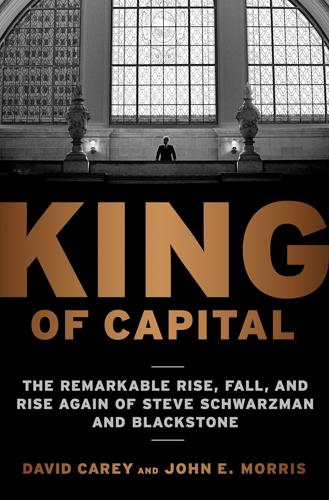
King of Capital: The Remarkable Rise, Fall, and Rise Again of Steve Schwarzman and Blackstone
by
David Carey
Published 7 Feb 2012
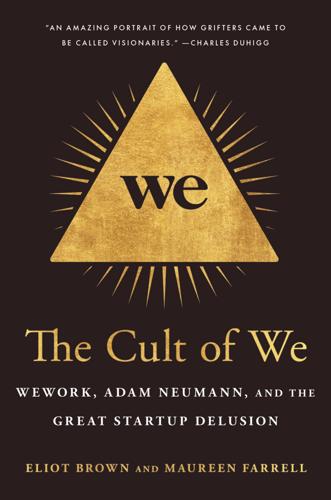
The Cult of We: WeWork, Adam Neumann, and the Great Startup Delusion
by
Eliot Brown
and
Maureen Farrell
Published 19 Jul 2021
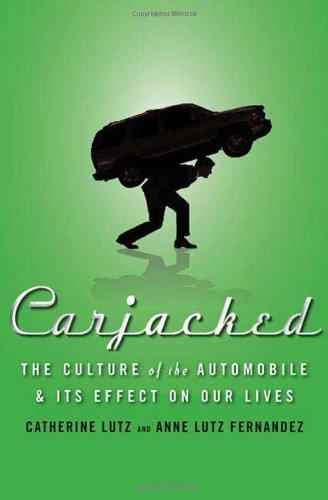
Carjacked: The Culture of the Automobile and Its Effect on Our Lives
by
Catherine Lutz
and
Anne Lutz Fernandez
Published 5 Jan 2010
Meanwhile, Cerberus Capital, the private equity firm that bought Chrysler in 2007, escapes,49 while the American public is likely on the hook for ten billion or more.50 And the much larger and far more costly General Motors restructuring resulted in the U.S. taxpayers’ owning a majority of the company’s stock, a $50 billion investment so risky no one else would take it. HEDGE FUND HANDS IN OUR POCKETS In the auto sector, as elsewhere in American business, manufacturing is no longer seen as the royal road to riches. Eerily echoing the reviled Gordon Gekko of Oliver Stone’s morality tale Wall Street, Ray Diallo, founder of hedge fund Bridgewater Associates, noted, “The money that’s made from manufacturing stuff is a pittance in comparison to the amount of money made from shuffling money around.” 2007 was the year many first learned 124 Carjacked the terms “predatory lending” and “hedge fund,” both of which have come to hit American car owners, not just home owners, with a vengeance.
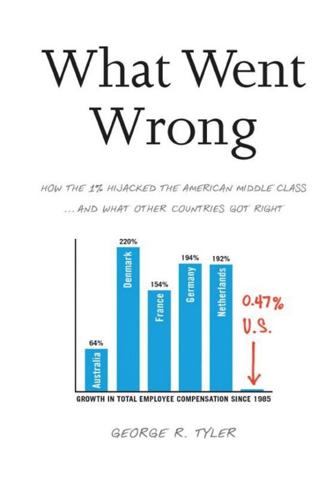
What Went Wrong: How the 1% Hijacked the American Middle Class . . . And What Other Countries Got Right
by
George R. Tyler
Published 15 Jul 2013
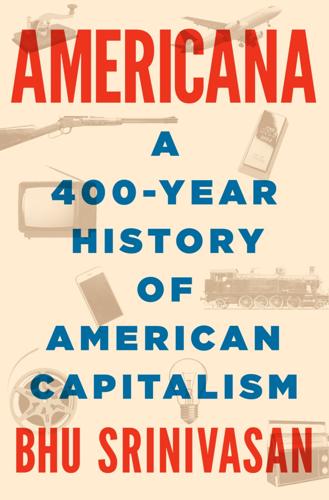
Americana: A 400-Year History of American Capitalism
by
Bhu Srinivasan
Published 25 Sep 2017
Keaton, a precocious and charming ball of comically moneyed ambition. Tom Wolfe’s The Bonfire of the Vanities spent several weeks at number one on the New York Times best-seller list in 1988. Its main character was a top-producing bond trader, a “Master of the Universe” in Wolfe’s telling. Oliver Stone’s Wall Street gave American cinema one of its most memorable antiheroes in Gordon Gekko, played by Michael Douglas. The fall of Gekko starts with his attempt to take over an airline, a story line loosely based on Icahn’s efforts at TWA. Douglas would lament the fact that even decades later, men would approach him in restaurants to tell him how inspired they were by his role—to pursue a career on Wall Street.
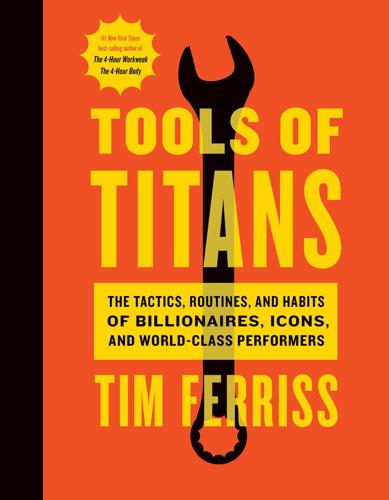
Tools of Titans: The Tactics, Routines, and Habits of Billionaires, Icons, and World-Class Performers
by
Timothy Ferriss
Published 6 Dec 2016
Reading it over and over again during my travels, I realized: Travel isn’t just for changing what’s outside, it’s for reinventing what’s inside. Enter Rolf Of all the outrageous throwaway lines that one hears in movies, there is one that stands out for me. It doesn’t come from a madcap comedy, an esoteric science-fiction flick, or a special-effects-laden action thriller. It comes from Oliver Stone’s Wall Street, when the Charlie Sheen character—a promising big shot in the stock market—is telling his girlfriend about his dreams. “I think if I can make a bundle of cash before I’m 30 and get out of this racket,” he says, “I’ll be able to ride my motorcycle across China.” When I first saw this scene on video a few years ago, I nearly fell out of my seat in astonishment.

Americana
by
Bhu Srinivasan
Keaton, a precocious and charming ball of comically moneyed ambition. Tom Wolfe’s The Bonfire of the Vanities spent several weeks at number one on the New York Times best-seller list in 1988. Its main character was a top-producing bond trader, a “Master of the Universe” in Wolfe’s telling. Oliver Stone’s Wall Street gave American cinema one of its most memorable antiheroes in Gordon Gekko, played by Michael Douglas. The fall of Gekko starts with his attempt to take over an airline, a story line loosely based on Icahn’s efforts at TWA. Douglas would lament the fact that even decades later, men would approach him in restaurants to tell him how inspired they were by his role—to pursue a career on Wall Street.
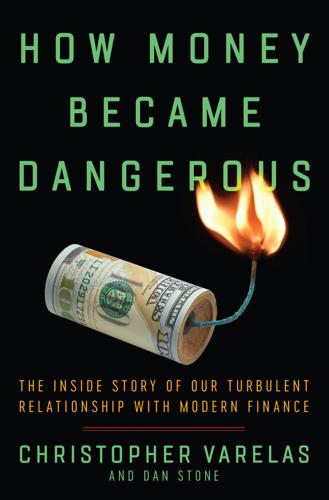
How Money Became Dangerous
by
Christopher Varelas
Published 15 Oct 2019
His ambition was to attend an Ivy League school, work as an investment banker, and make a fortune. Wall Street accepted and embraced the public’s new definition of the financial world, never imagining that such a reputation would become problematic years later. The 1987 film Wall Street signified more than career highlights for Oliver Stone and Michael Douglas, who won an Oscar for his role. It also illuminated a massive shift in American culture and consciousness. That an Oscar would be awarded for the portrayal of a corporate raider would have been unimaginable only a few years prior, as most Americans still didn’t know the ins and outs of the financial industry.
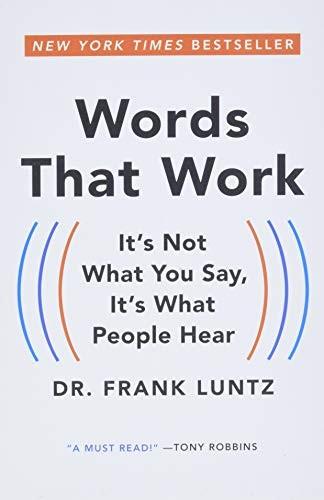
Words That Work: It's Not What You Say, It's What People Hear
by
Dr. Frank Luntz
Published 2 Jan 2007
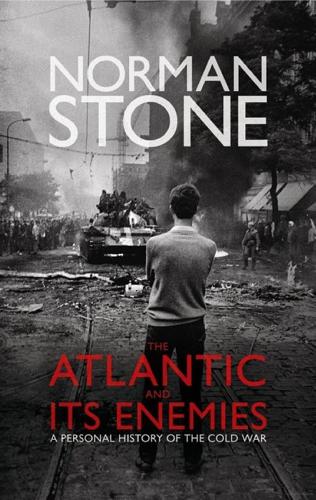
The Atlantic and Its Enemies: A History of the Cold War
by
Norman Stone
Published 15 Feb 2010
In 1934 the Stavisky scandal had almost destroyed republican, democratic France, since government ministers and parliamentary deputies had been found to be involved in an upended credit pyramid, the apex of which stood in the municipal pawn-shop of Bayonne; the Madoff running it was found dead in mysterious circumstances. Now, in New York, life imitated art, in this case Tom Wolfe’s Bonfire of the Vanities and Oliver Stone’s Wall Street: the makers of ‘junk bonds’ vanished into prison as recession pricked their bubbles. In London the empire of Robert Maxwell collapsed. He (repulsively: the baseball cap making it worse), larger than life, was a lie from the start. He was not, as he claimed, a Czech and therefore a gallant ally.
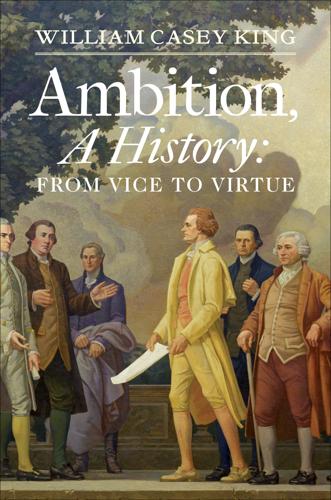
Ambition, a History
by
William Casey King
Published 14 Sep 2013
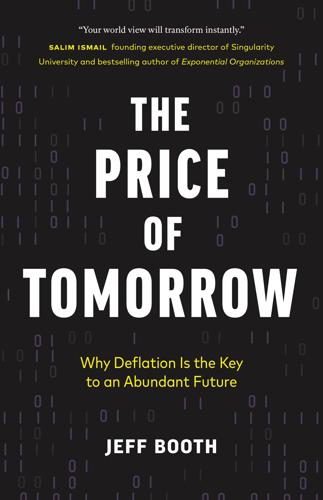
The Price of Tomorrow: Why Deflation Is the Key to an Abundant Future
by
Jeff Booth
Published 14 Jan 2020
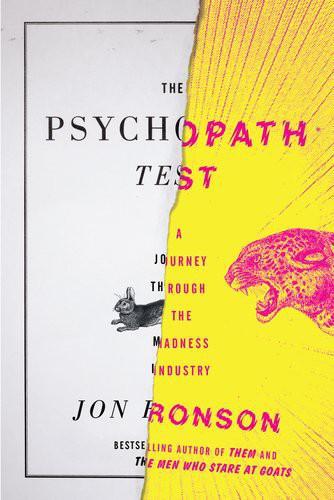
The Psychopath Test: A Journey Through the Madness Industry
by
Jon Ronson
Published 12 May 2011
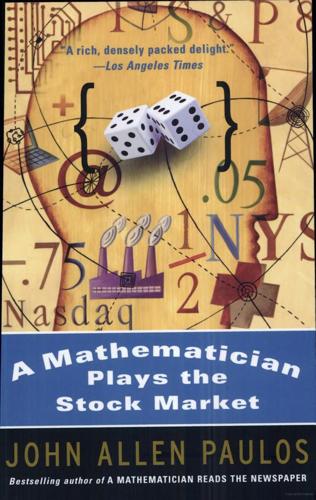
A Mathematician Plays the Stock Market
by
John Allen Paulos
Published 1 Jan 2003
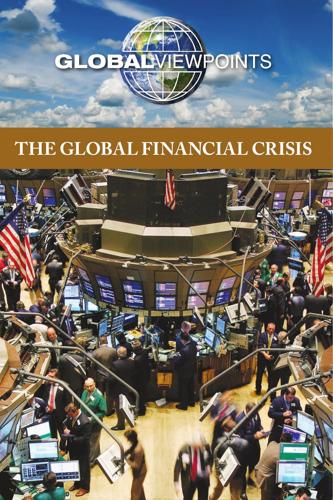
Global Financial Crisis
by
Noah Berlatsky
Published 19 Feb 2010
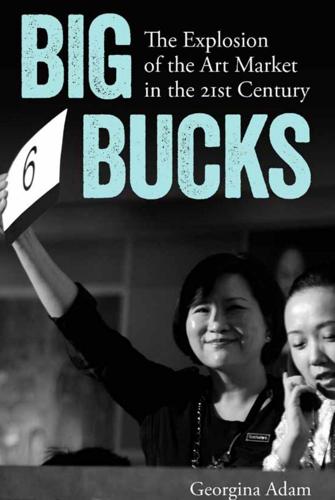
Big Bucks: The Explosion of the Art Market in the 21st Century
by
Georgina Adam
Published 14 Jun 2014
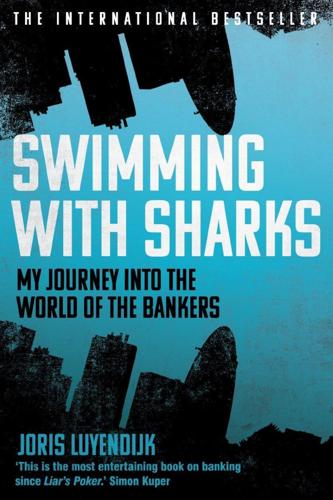
Swimming With Sharks: My Journey into the World of the Bankers
by
Joris Luyendijk
Published 14 Sep 2015

The Gods of New York: Egotists, Idealists, Opportunists, and the Birth of the Modern City: 1986-1990
by
Jonathan Mahler
Published 11 Aug 2025
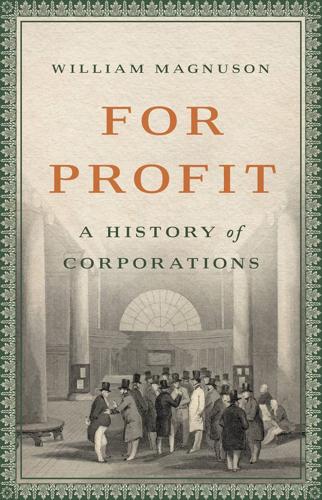
For Profit: A History of Corporations
by
William Magnuson
Published 8 Nov 2022
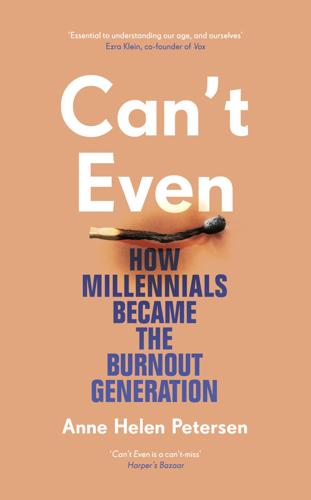
Can't Even: How Millennials Became the Burnout Generation
by
Anne Helen Petersen
Published 14 Jan 2021
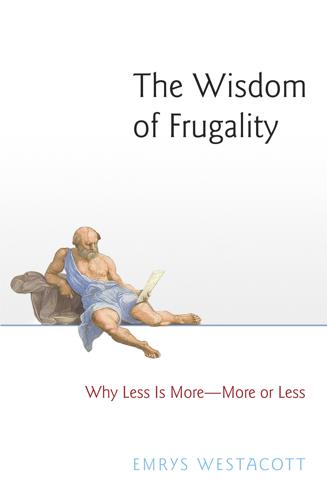
The Wisdom of Frugality: Why Less Is More - More or Less
by
Emrys Westacott
Published 14 Apr 2016
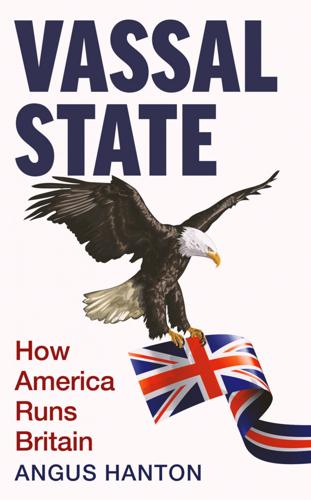
Vassal State
by
Angus Hanton
Published 25 Mar 2024
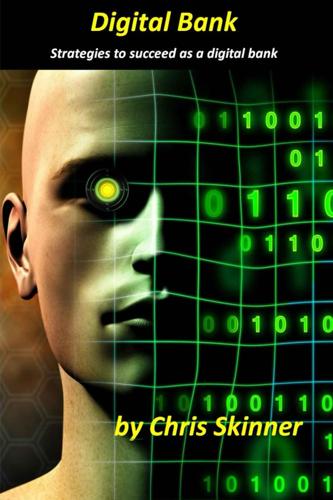
Digital Bank: Strategies for Launching or Becoming a Digital Bank
by
Chris Skinner
Published 27 Aug 2013
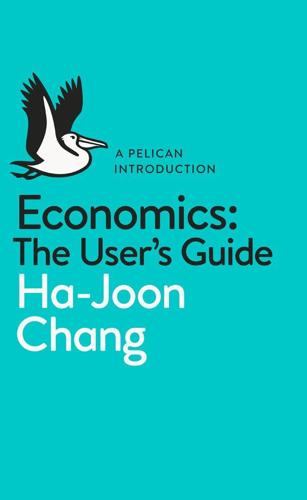
A Pelican Introduction Economics: A User's Guide
by
Ha-Joon Chang
Published 26 May 2014
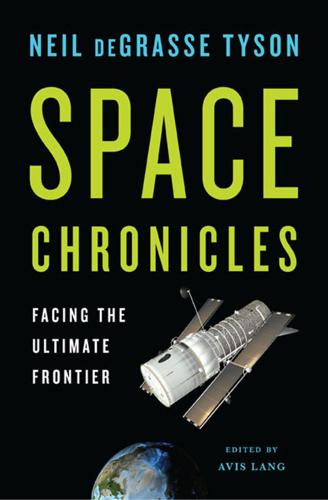
Space Chronicles: Facing the Ultimate Frontier
by
Neil Degrasse Tyson
and
Avis Lang
Published 27 Feb 2012
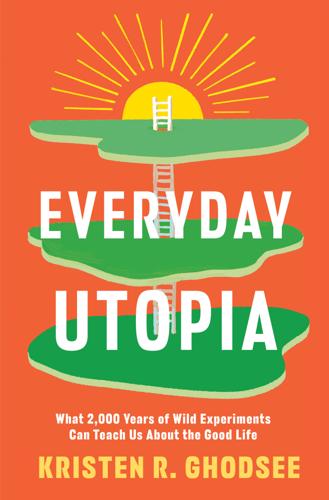
Everyday Utopia: What 2,000 Years of Wild Experiments Can Teach Us About the Good Life
by
Kristen R. Ghodsee
Published 16 May 2023
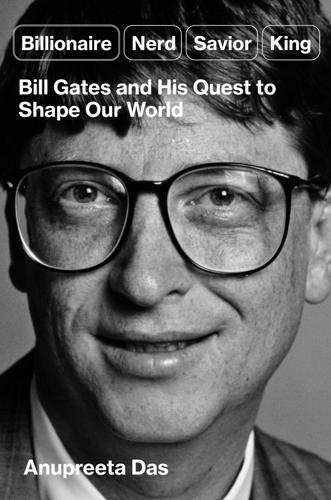
Billionaire, Nerd, Savior, King: Bill Gates and His Quest to Shape Our World
by
Anupreeta Das
Published 12 Aug 2024
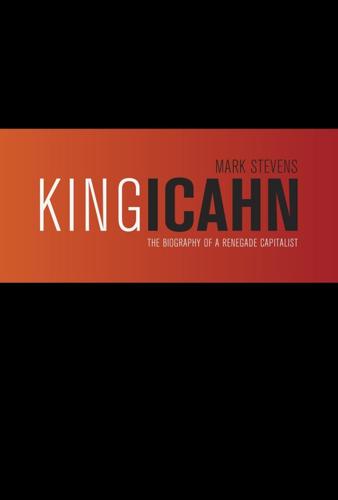
King Icahn: The Biography of a Renegade Capitalist
by
Mark Stevens
Published 31 May 1993
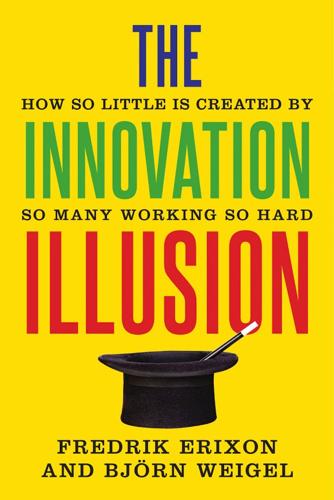
The Innovation Illusion: How So Little Is Created by So Many Working So Hard
by
Fredrik Erixon
and
Bjorn Weigel
Published 3 Oct 2016
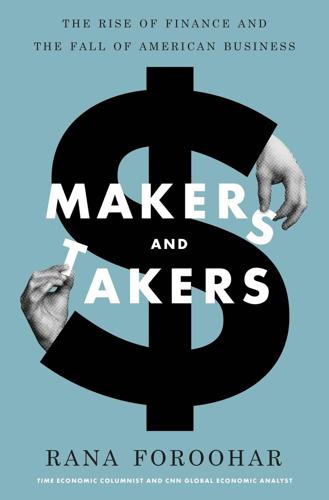
Makers and Takers: The Rise of Finance and the Fall of American Business
by
Rana Foroohar
Published 16 May 2016
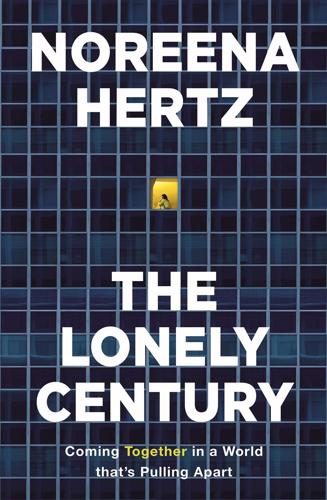
The Lonely Century: How Isolation Imperils Our Future
by
Noreena Hertz
Published 13 May 2020
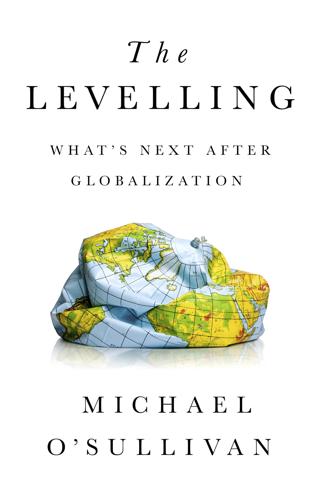
The Levelling: What’s Next After Globalization
by
Michael O’sullivan
Published 28 May 2019
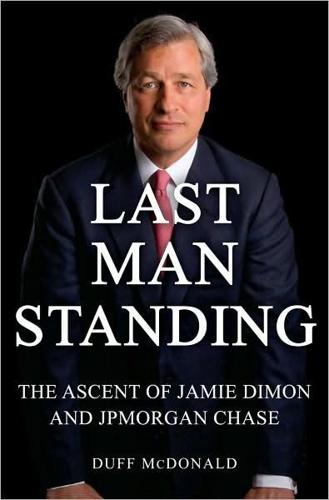
Last Man Standing: The Ascent of Jamie Dimon and JPMorgan Chase
by
Duff McDonald
Published 5 Oct 2009
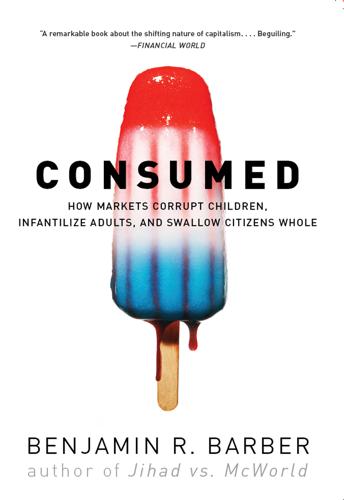
Consumed: How Markets Corrupt Children, Infantilize Adults, and Swallow Citizens Whole
by
Benjamin R. Barber
Published 1 Jan 2007
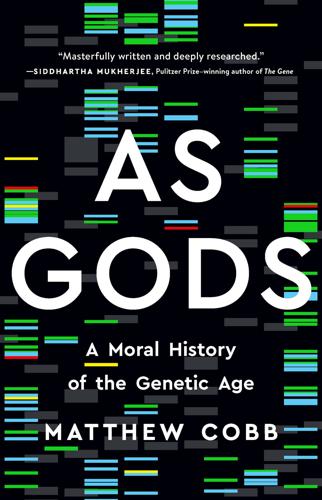
As Gods: A Moral History of the Genetic Age
by
Matthew Cobb
Published 15 Nov 2022
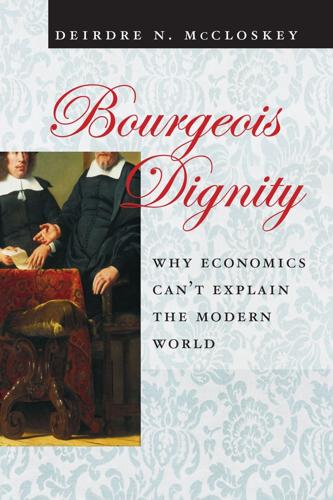
Bourgeois Dignity: Why Economics Can't Explain the Modern World
by
Deirdre N. McCloskey
Published 15 Nov 2011

WTF?: What's the Future and Why It's Up to Us
by
Tim O'Reilly
Published 9 Oct 2017
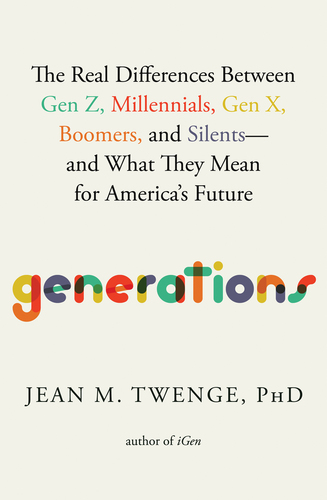
Generations: The Real Differences Between Gen Z, Millennials, Gen X, Boomers, and Silents—and What They Mean for America's Future
by
Jean M. Twenge
Published 25 Apr 2023
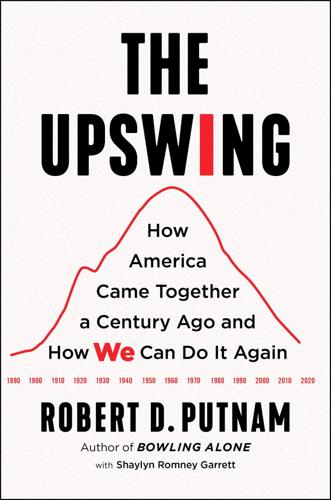
The Upswing: How America Came Together a Century Ago and How We Can Do It Again
by
Robert D. Putnam
Published 12 Oct 2020
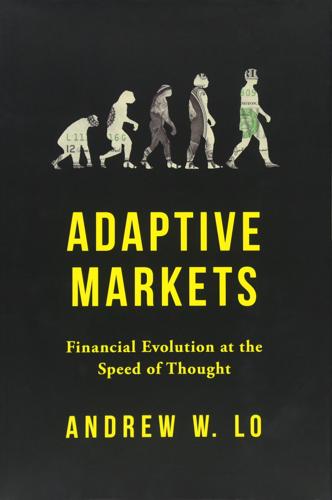
Adaptive Markets: Financial Evolution at the Speed of Thought
by
Andrew W. Lo
Published 3 Apr 2017
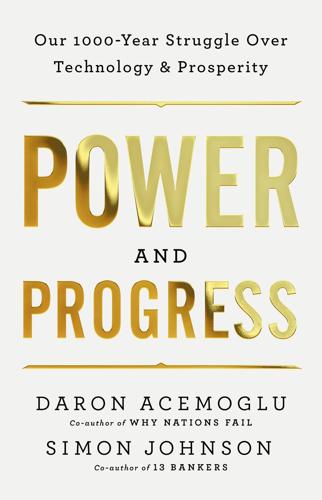
Power and Progress: Our Thousand-Year Struggle Over Technology and Prosperity
by
Daron Acemoglu
and
Simon Johnson
Published 15 May 2023
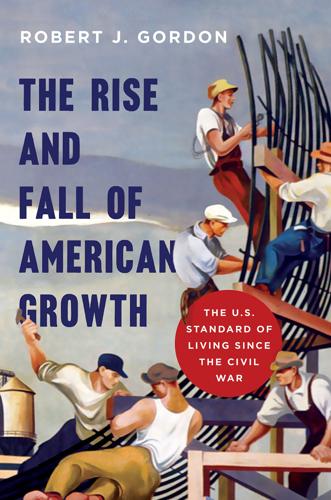
The Rise and Fall of American Growth: The U.S. Standard of Living Since the Civil War (The Princeton Economic History of the Western World)
by
Robert J. Gordon
Published 12 Jan 2016